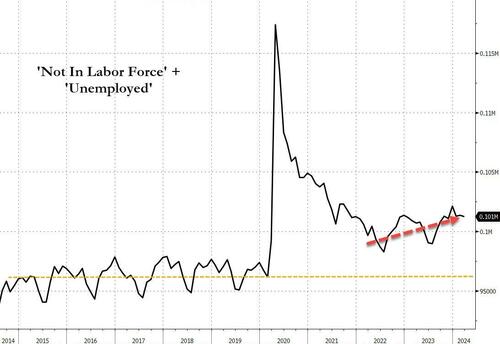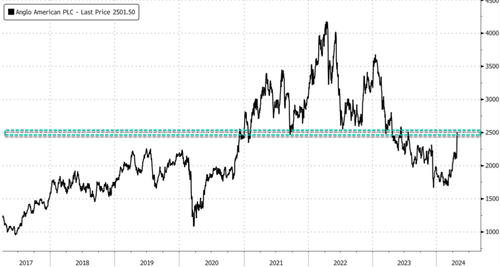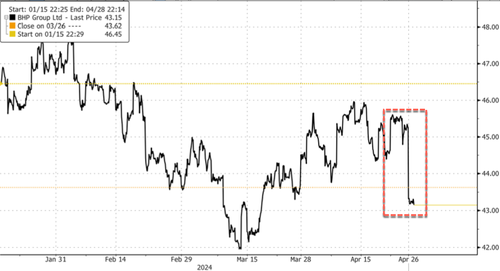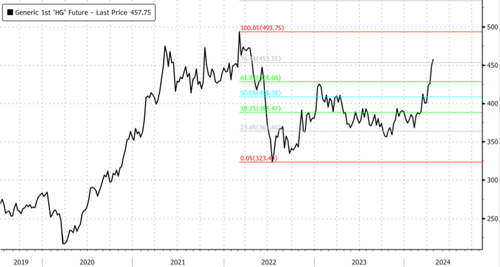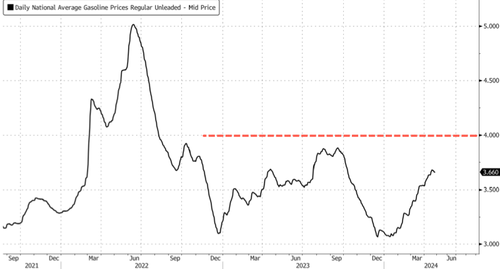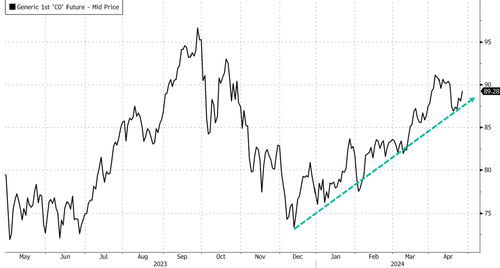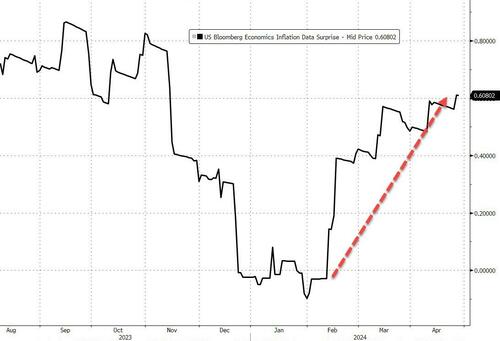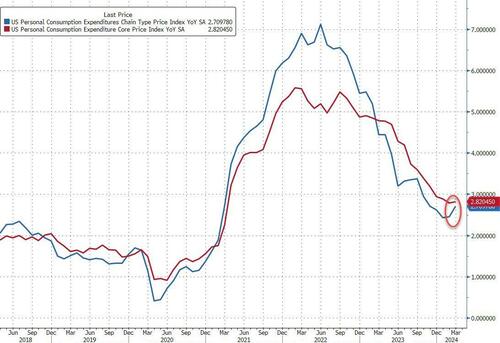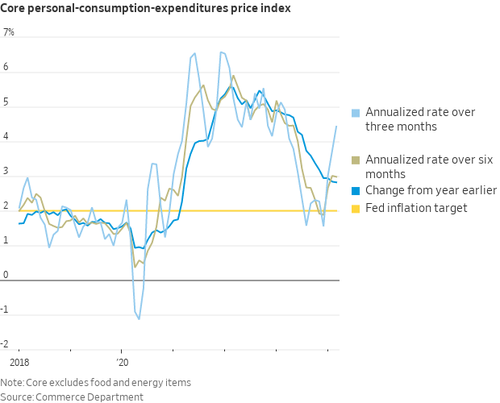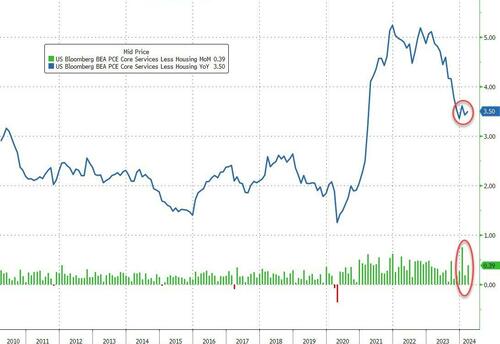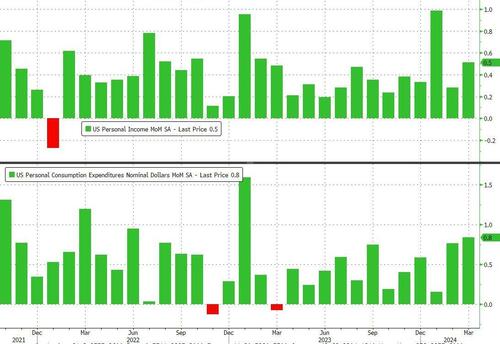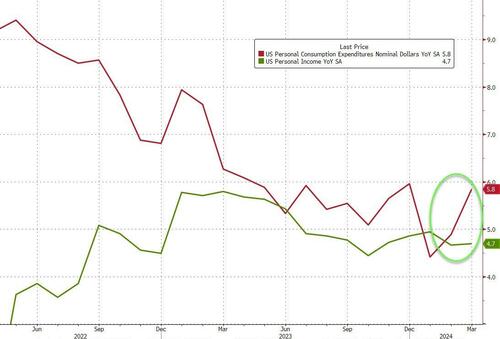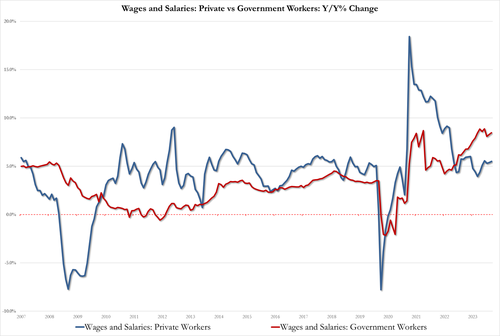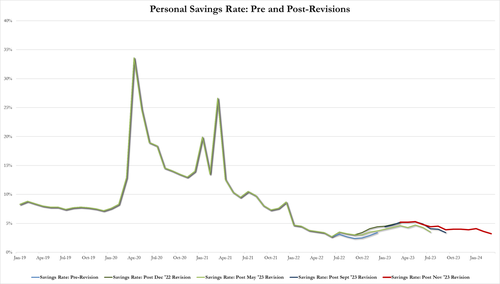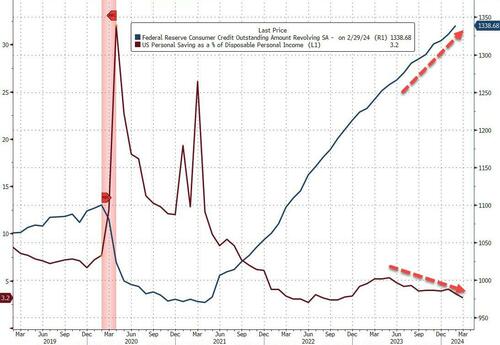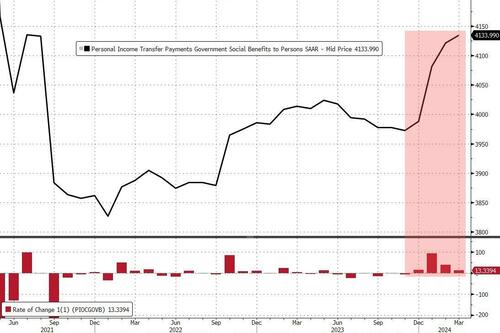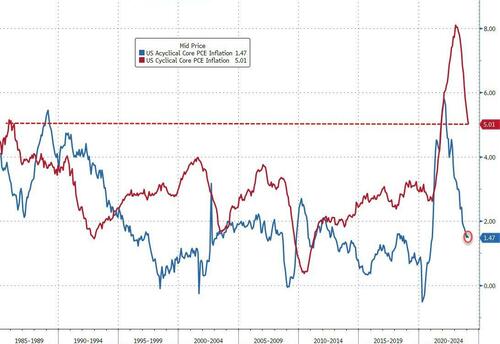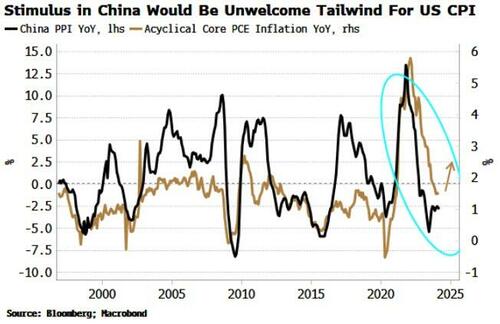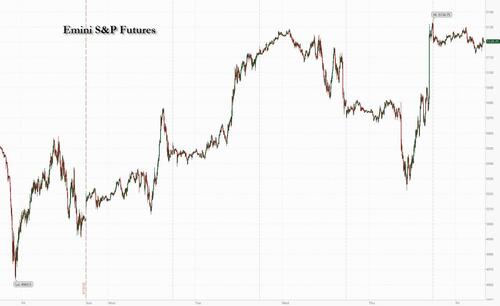One can readily admit that the Magisterium's manner of expression does not seem very easy to understand at times. It needs to be translated by preachers and catechists into a language which relates to people and to their respective cultural environments. The essential content of the Church's teaching, however, must be upheld in this process. It must not be watered down on allegedly pastoral grounds, because it communicates the revealed truth.
Distinction Matter - Subscribed Feeds
-
Site: Mises InstituteHelp us bring crucial truths about economics and history to laymen by supporting our publication efforts this year!
-
Site: Mises InstituteEconomists use time preference to explain the existence of interest, but the ability of people to postpone some present consumption in order to save for the future has much broader social ramifications.
-
Site: Steyn OnlineProgramming note: Please join us this Sunday at SteynOnline for some special musical programming. ~Just ahead of Episode Eight of our current Tale for Our Time, a word from your host: As I predicted three-and-a-half years ago, just ahead of America's
-
Site: LifeNews
With its dual rulings on abortion, the Florida Supreme Court delivered Governor Ron DeSantis both a major victory and one of the greatest challenges yet to his legacy as governor. Babies with a heartbeat will be protected starting May 1. However, a constitutional amendment to enshrine all-trimester abortion will appear on the ballot this November.
I was recently in Florida talking with donors about the implications of the ballot measure and Big Abortion’s attack on the states. Rewriting state constitutions is key to the abortion lobby’s national strategy after Dobbs. Out-of-state billionaires and far-left groups like the ACLU and Planned Parenthood are going around the country, picking off pro-life states with deceptive ballot measures that override existing laws to create a right for second- and third-trimester abortion.
But until now, they haven’t had to contend with Ron DeSantis.
DeSantis recently called out the amendment for being too extreme and misleading. This clarity from the governor will be worth more than millions of dollars in deception from the abortion industry, and is an example for every pro-life governor facing an abortion amendment.
Click here to sign up for pro-life news alerts from LifeNews.com
At a press conference for a bill signing, the governor said the ballot measure is like a California abortion law which would remove parental consent laws from the books. He also said, “These things cost tens of millions of dollars . . . so somebody’s paying for that and somebody’s going to benefit from that.”
That somebody is Big Abortion. Nearly one-third of the money raised for Florida’s abortion measure comes straight from the abortion industry. Mona Reis, an owner of a large abortion facility in the state, is a key driving force behind the measure, as she and others in the industry stand to realize a major ROI when they can perform abortions at any time, with zero state regulations and without parents standing in their way.
The millions coming from the abortion industry and the ACLU will center upon one key message: the lie that women will have to leave the state to receive care for a miscarriage or a life-threatening pregnancy complication. In Ohio last year, the pro-abortion side lied 14 times about this during a televised debate. Pro-abortion forces spent a staggering $66.7 million promoting these deceptions, outspending pro-life advocates two to one.
In Florida, CNN is already parroting the abortion lobby’s lie on a “public health crisis,” despite the fact that a small fraction of abortions are for medical reasons, and the heartbeat law contains no fewer than five different exceptions including the mother’s life and a fatal prenatal diagnosis.
If anyone can cut through the lies, DeSantis can.
The truth is, Prop 4 threatens to erase years of progress on life made during the DeSantis administration.
Florida would again become a southeastern sanctuary state for barbaric late-term abortions when babies feel pain. In Ohio, abortion supporters conceded that their amendment failed to define what a “health” reason means, leaving it up to the abortionist who directly profits.
Florida’s law requiring parental consent – not merely notification – for minors before an abortion, which DeSantis signed in 2020 with the support of nearly three quarters of Florida voters, would be eviscerated. The governor recently pointed out the deceptive way the ballot measure mentions parental notification after a minor has had an abortion but eliminates parental consent. “Don’t be fooled though, that is severing the parental consent for minors,” he said.
Prop 4 would also gut health and safety standards that have led the state to shut down abortion facilities that severely injure women. Any “healthcare provider” – not even a doctor – would be free to perform abortions regardless of medical expertise.
Florida has one advantage that Ohio did not: the amendment must get 60 percent of the vote to pass. The state has a Republican voter registration advantage of nearly one million and growing. Passage is not a certainty, even with virtually unlimited money (and paid pro-abortion activists who are willing to cheat). It is a winnable fight – but only if voters really understand what’s at stake and Republicans especially turn out to vote NO.
Gov. DeSantis understands how to win on abortion. By combining clarity, compassion and contrast, DeSantis fended off a challenge from former U.S. Rep. Charlie Crist after signing the 15-week late-term abortion limit into law. DeSantis was clear and unapologetic about his own stance. He showed that Floridians care about women while at the same time humanizing the unborn child. He went on offense to expose the extremism of his opponent, who refused to protect babies even when they are born alive after failed abortions.
While federal candidates who chose the “ostrich strategy” of avoiding the issue suffered heavy losses, DeSantis won re-election by nearly 20 points.
With the support of 62 percent of Florida voters, DeSantis then signed the Heartbeat Protection Act, which also allocated $25 million immediately for the state’s pregnancy centers to serve more moms during pregnancy and beyond. In his presidential campaign, DeSantis defended heartbeat protections against critics in the media and in his own party.
Right now, pro-abortion Democrats wrongly believe they have an unbeatable formula, with abortion as the silver bullet that will save them from an unpopular incumbent and failed administration. President Biden rolled out a “seven-figure” ad campaign and an abortion tour with his latest stop in Florida this week. Hillary Clinton weighed in, as did DeSantis’ nemesis in California, Governor Gavin Newsom. But as DeSantis says, Florida isn’t California. In their overconfidence, seizing on a bombastic goal of flipping Florida may prove a big mistake.
This moment poses DeSantis’ greatest opportunity yet – to save lives and defeat the Left. As the governor says, Florida is “where woke goes to die” and with his help, it will be where Big Abortion’s plans die too.
LifeNews Note: Marjorie Dannenfelser is president of Susan B. Anthony Pro-Life America and author of “Life is Winning: Inside the Fight for Unborn Children and Their Mothers.” Jeanne Mancini is the president of the March for Life.

The post Ron DeSantis Leads Fight Against Florida Amendment for Abortions Up to Birth appeared first on LifeNews.com.
-
Site: Saint Louis Catholic
Yes, that’s right, God’s providence and omnipotence are no match for “carbon”, “greenhouse gases”, or whatever other meaningless dreck the globalists accuse you of doing to ruin the planet.
One can legitimately ask if this man has any supernatural faith. The alternative theory is far, far worse.
-
Site: LifeNews
Jesuit-affiliated Xavier University in Cincinnati, OH, appears to list abortion on its student health insurance plan. The university maintains that it does not cover abortion.
“[Xavier’s] plan not only appears to cover abortion – it looks like the school specifically added it into the coverage,” Hope College student William Hurley wrote in The College Fix Tuesday.
“A ‘policy endorsement’ on the plan appeared to delete an ‘exclusion’ of abortion,” Hurley indicated:
The plan lists abortion as a “Non-EHB [Essential Health Benefit] added to plan via additional endorsement.” It includes, like other covered benefits, the amount the plan pays for in-network and out-of-network providers.
…
“Benefits will be paid at the benefits levels indicated in the schedule of benefits,” the endorsement states.
The “policy endorsement” in question “appears to be signed by university President Colleen Hanycz,” added Hurley.
An Xavier public relations employee denied that the plan covered abortion when he was asked by the Fix.
“He said ‘nothing has changed regarding this policy from previous years,’” Hurley noted. The employee also claimed that “there are few enrollees in the plan.”
Click here to sign up for pro-life news alerts from LifeNews.com
Last month, Xavier spokesman David Hamilton told the Fix: “The confusion regarding the wording is definitely understandable — but again, the answer to your question is, no, elective abortions are not a covered benefit under the policy.”
A PDF of the plan linked in Hurley’s article mentions abortion a total of nine times.
“Benefits for therapeutic abortion are provided only when the therapeutic abortion is performed: To save the life of the mother [or] [a]s a result of a case of rape or incest,” the plan states under its “Medical Expense Benefits” section.
An April 2022 post to Xavier Students For Life’s X (then known as Twitter) account featured a picture of three members of the student pro-life group meeting with President Hanycz.
So glad for the opportunity to meet with @PrezHanycz today to discuss ways of promoting an open dialogue of the life issues on campus, as well as ways to build a culture of life and serve the most vulnerable in our community! #AllForOne #LetsGoX pic.twitter.com/rp7WSDWwWl
— Xavier Students For Life (@xustudents4life) April 6, 2022
“So glad for the opportunity to meet with [Hanycz] today to discuss ways of promoting an open dialogue of the life issues on campus, as well as ways to build a culture of life and serve the most vulnerable in our community!” the post states.
Hanycz is the first lay president in Xavier’s 193-year history. She previously served as president of two other Catholic institutions of higher education: La Salle University in Philadelphia, and Brescia University College in London, Ontario, Canada.
Her profile page on the Jesuit university’s website declares: “President Hanycz has been an active proponent of Catholic education as a means to advance the common good and to celebrate the dignity of each person, and will continue this commitment in a Jesuit setting at Xavier.”
Readers can find Hurley’s full article in The College Fix here.
LifeNews Note: Joshua Mercer writes for CatholicVote, where this column originally appeared.

The post This Catholic University Claims Its Student Health Insurance Plan Doesn’t Cover Abortions appeared first on LifeNews.com.
-
Site: Zero HedgeWhy Are There So Many Americans That Can't Find A Job Even Though They Are Desperate To Be Hired?Tyler Durden Fri, 04/26/2024 - 09:50
Authored by Michael Snyder via The Economic Collapse blog,
According to the absurd numbers that the government feeds us, the unemployment rate is very low and there are lots of jobs available. But if what they are telling us is true, why are so many Americans not able to find work? As you will see below, some people haven’t been hired even though they have literally applied for hundreds of jobs.
There seems to be an enormous disconnect between what is actually happening in the real economy and the economic narrative that they are constantly pushing. By the time you are done reading this article, I think that you will agree with me.
Earlier this week, I received an email from a reader that has not been able to find work after seven months of searching.
He gave me permission to share part of that email with you, and it is certainly quite heartbreaking…
Hi Michael,
I am a long-time reader of theeconomiccollapseblog.com, and your recent article comparing the economy to the movie “Weekend at Bernie’s” really stood out to me.
I’m really trying to figure out WHY it is so hard to find a job.
I was laid off from my job as a Custodial Foreman in September 2023, and have had ZERO results for my countless hours spent searching for comparable work.
I don’t know if you want to use any of this for an article or not, but if you do, please just keep doing what you normally do: Praising Jesus Christ. Without my faith in him I don’t know what I’d do.
When I wake up, I make coffee and turn on the computer and go through the state’s unemployment job search sites they provided me when I was laid off. I have been looking and also applying for jobs DAILY since September 2023. And these are not “rocket science” positions; I’m simply looking for Maintenance or Custodial or Groundskeeper type jobs. You know, “normal working class” type jobs.
But after ~300 applications (And these are all just to the jobs that I not only have experience for but also would actually want to do), I have had 1 interview. One interview in 7 months of applying and sending tailored cover letters with, daily!
If the economy is doing so “great”, why can’t he find employment?
Some of you may be tempted to think that he is just an isolated case.
Well, here is another example of an experienced worker that has applied for approximately 300 jobs without any success…
Royal Siu, who lives in Seattle and is trained as a pharmacist, likes to make his friends guess how many jobs he’s applied to. They’ll often toss out some number around 40, he told BI. He’ll tell them to keep going. Most give up by the time they reach 100. That’s when Siu drops that he’s applied to about 300 jobs. “It’s usually a shock factor to them,” he said.
Siu, who’s trying to use his pharmacy degree to work in other parts of healthcare, is finding it harder to land interviews than in a prior job search. The 28-year-old was getting more phone screenings and first and second interviews in the past. This time, it’s been a couple of months since he had a screening call. So he continues to turn to his network but also doesn’t stop applying.
What in the world is going on here?
I thought that there were “millions” of good jobs just waiting for someone to step into them.
Something definitely does not add up.
Even Americans with advanced degrees from top schools are increasingly finding themselves out of work.
If you doubt this, just check out these numbers…
Even at some top business schools, the number of recently minted M.B.A.s without jobs has roughly doubled from a couple of years ago, when U.S. companies were rushing to hire as many workers as they could, according to data from the schools.
At Harvard Business School, 20% of job-seeking 2023 M.B.A. graduates didn’t have one three months after graduation, up from 8% in 2021. At Stanford’s Graduate School of Business, 18% didn’t, compared with 9% in 2021. About 13% of those at the Massachusetts Institute of Technology’s Sloan School of Management didn’t have a job within three months, up from about 5% in 2021.
How are those numbers possible if the unemployment rate is hovering near “historic lows”?
Of course the truth is that we have been sold a lie.
If you do not have a job, you are classified by the U.S. government as either “unemployed” or “not in the labor force”.
In 2008 and 2009, the combined total of those two categories never even reached 90 million.
Today, the combined total of those two categories is over 106 million.
The Biden administration says that only 6,429,000 Americans are officially “unemployed”.
The other 99,989,000 Americans without a job are considered to be “not in the labor force”.
And more will be lumped into those two categories soon, because large employers all over the nation continue to conduct mass layoffs.
For example, thousands of Tesla workers in California and Texas were just notified that they will be losing their jobs…
The notifications in California and Texas, where the electric vehicle (EV) maker has large presences, came in the form of WARN notices, according to reports.
In California, the planned Tesla headcount reductions will hit approximately 3,300 workers, The San Francisco Standard reported Tuesday.
They will apparently occur at locations in a total of four different cities in the Golden State.
Meanwhile, Texas will see almost 2,700 employees in Austin lose their jobs, according to the Austin American-Statesman.
Sadly, the pace of layoffs is likely to increase during the months ahead, because business activity in the U.S. is declining…
The U.S. economy lost momentum in April, a pair of S&P surveys found, as businesses reported a decline in new orders and reduced employment for the first time since the pandemic.
The flash U.S. manufacturing purchasing managers index slipped to a four-month low of 49.9 in April from 51.9 in March.
The S&P flash U.S. services PMI fell to a five-month low of 50.9 this month from 51.7 in March.
The surveys are the first indicators of each month to give a sense of how the U.S. economy is performing.
Meanwhile, the cost of living crisis just continues to escalate.
Shockingly, at one station in California gasoline now costs $7.29 per gallon…
Soaring gas prices have skyrocketed to a whopping $7.29 per gallon in some parts of California – which is above the current the national hourly minimum wage.
While the average price for a gallon of gas varies from state to state – drivers in a certain Silicon Valley town are facing particularly extortionate rates that set them back almost $150 for a full tank.
The Chevron gas station in Menlo Park was exposed on Sunday by a bewildered customer who posted on X that the price per gallon was four cents ‘above the federal hourly minimum wage.’
If you think that this is bad, just wait until the war in the Middle East transforms into the apocalyptic conflict that I believe it will become.
I am entirely convinced that inflation will continue to be a major problem even as economic activity in the U.S. slows down even more.
We are already experiencing “stagflation”.
What is eventually coming will be so much worse than that.
Of course the economic pain that we are going through is just one of the factors that is systematically destroying our nation.
A Warning to America: 25 Ways the US is Being Destroyed | Explained in Under 2 Minutes pic.twitter.com/qwmBO8DmMt
— Western Lensman (@WesternLensman) April 22, 2024Just about all of our major institutions are crumbling, just about every sector of our society is in the process of melting down, and conditions are rapidly getting worse all around us.
And now we are heading into the most chaotic election season in the entire history of our country.
This is a recipe for disaster, but there is no turning back now.
* * *
Michael’s new book entitled “Chaos” is available in paperback and for the Kindle on Amazon.com, and you can check out his new Substack newsletter right here.
-
Site: Ron Paul Institute - Featured Articles
A version of this article first appeared as an exclusive update to RPI subscribers. Subscribe for free here.
Student action on university campuses against US involvement in Israel’s slaughter of Gaza has exploded across the country. Suddenly there is the distinct feel in the air of the anti-Vietnam war protests once they finally caught on in 1968 and soon thereafter changed the course of US history.
Both protest movements were fully demonized by the same forces of the mainstream Left/Right regime and what libertarian writer Jacob Hornberger rightly calls the “National Security State.” I would add the mainstream media from Fox to MSNBC. But these days there is relatively more freedom of expression available to Americans via some of the social media outlets. The US government war on one of these outlets – TikTok – may also be fueling protests, as this outlet is particularly popular among younger Americans and has become the platform for them to hear more objective and independent views on what is happening in Gaza. It should not be considered a coincidence that not long after Anti-Defamation League’s Jonathan Greenblat was caught on tape panicking over the shift in opinion away from fealty to Israel among the younger generation, a big PR operation about “Chinese infiltration” of the platform emerged as did calls to ban the popular application.
“We have a major, major, major generational (TikTok) problem,” Greenblat said. This past week both Houses of Congress voted to ban TikTok. Problem solved? Not exactly.
So back to the protests.
Tens of thousands of students from New York’s Columbia University to the University of Southern California have risen up to demand an end to US support for Israel’s 200 day – and counting – total demolition of Gaza in retribution for the October 7th Hamas bloody incursion into Israeli territory.
To date, more than 35,000 Palestinian civilians in Gaza have been killed including an estimated 15,000 children. Hamas, by contrast, is reportedly not significantly degraded and its massive tunnel system remains intact. Former Israeli Defense Forces General Yitzhak Brick told Israeli newspaper Maariv that Israel has already lost the war against Hamas and must admit it.
The wild disproportionality of the Israeli response has animated and ignited the sense of repulsion and demand for justice among the nation’s youth. Most recently the grisly details of Israel’s apparent mass slaughter of hundreds of patients at the Nasser Hospital in Gaza – many discovered with their hands and feet bound – may have been the last straw that led to mass student action across the country.
When the wave of student protests settled in the Lone Star State on Wednesday, Texas Governor Gregg Abbott wasted no time at all calling in the Texas State Troopers to smash the protest at the University of Texas. Heavily-armed Troopers – some on horseback – marched onto campus attempting to force the crowd of protesters to disburse. As might be expected, the situation very quickly got out of hand, with Troopers assaulting and arresting those participating in what began as a peaceful protest.
Shortly after siccing the heavily armed state militia on student protestors, Abbot released this Tweet:Arrests being made right now & will continue until the crowd disperses.
— Greg Abbott (@GregAbbott_TX) April 24, 2024
These protesters belong in jail.
Antisemitism will not be tolerated in Texas. Period.
Students joining in hate-filled, antisemitic protests at any public college or university in Texas should be expelled. https://t.co/XhLlQdvUl0Abbott’s blanket accusation that these protests are prima facie anti-Semitic is belied by the fact that Jews across the country are participating in the mass action, including on university campuses.
There is clearly a major attempt being made to conflate legitimate concern over tens of thousands of Palestinian civilians being slaughtered – and hundreds of thousands facing starvation – with blanket hatred of Jewish people. But the youth are not buying it. So it’s time to send in the militarized police to shut down peaceful protest and the First Amendment.
In the case of Texas, one cheeky conservative Twitter/X user pointed out that, “Abbott sent more troops to shutdown peaceful protests at UT than he did to secure the border.”
Ouch – but revealing.
Other observers have similarly pointed out the hypocrisy of the massive deployment of militarized police to quell a peaceful political protest, commenting on a video montage of police beating and arresting American university students that, “imagine if this video was out of Tehran University in Iran, our politicians & media would have endless calls for regime change.”
Throughout the country, many “influencers” on the professional political Right are acting like the “woke snowflakes” they have derided, demanding that our fundamental liberty to freely assemble and speak our minds be amended in this particular instance due to the subject matter.
Many “professional right-wingers” have done their best to try and convince us that these protesters are identical to the BLM protesters of several years ago. Matt Walsh at the Daily Wire put out a podcast today claiming that, “The ‘Free Palestine’ Movement Is Just BLM Repackaged.”
The problem in his and the rest of their calculus is that the state and local authorities would not lift a finger to stop the BLM riots, yet they are cracking heads robustly among the Palestine protests.
Walsh even seemed to sense the inconsistency in his logic, questioning Governor Abbott’s move against the protesters by Tweeting, “Did Abbott ever arrest BLM protesters for antiwhiteism? Is antisemitism the only hateful ideology not permitted in Texas? Are you legally allowed to hate some groups but not others?”
He added, in a criticism of Abbot’s suggestion that the protesters were being arrested for “antisemitism,” that, “If you’re arresting them for an illegal encampment or for making threats then say that. But arresting people for ‘antisemitism’ is obviously a clear violation of the First Amendment. I can’t stand these protesters but you can’t arrest people simply for having ‘hateful’ views.”
He deserves credit for this observation.
As is often the case, action by state actors against this protest movement will only strengthen the movement. We have not even seen the beginning of what is in store
Polls clearly show that a considerable majority in America believes Israel has gone way too far in its reaction to October 7th. America for the first time in my lifetime is in the majority opposed to Israel, and that shift is more than anything else a generational shift. Hence Greenblat’s panic.
This movement is picking up steam and threatens to turn Biden’s big Democratic Convention coronation ceremony into the disastrous 1968 Democratic Convention in Chicago, where the Lyndon Johnson campaign went to die. Ironically the Democratic Party convention this year is to be held in…Chicago!
May 4th will be the 54th anniversary of Nixon’s National Guard killing four students at Ohio’s Kent state University for protesting our killing squads in Vietnam (My Lai massacre). Will soldiers in the US start cutting protesters down again?
-
Site: Ron Paul Institute - Featured Articles
The Texas Lottery has paid out many millions of dollars to winners of its games of chance since voters in the state approved its creation in 1991. This week, Texas Governor Greg Abbott announced a new lottery of sorts — the “Texas Antisemitism Lottery” — that could rival and maybe even surpass the original Texas Lottery in cash payouts.
One of the more sure things in constitutional law is that a person subjected to punishment by government because of the content of his communication has had his free speech rights violated and, therefore, should be compensated for the harm. This is especially the case when that communication is centered on political matters, such as actions of the Israel government undertaken in its United States government funded and armed war effort. Thus, it is unusual to see government publicly declaring its intention to take action to wipe out the expression of a particular viewpoint.
Nonetheless, that is just what the governor of Texas did on Wednesday when he posted the following message at Twitter above another individual’s Twitter post including video of police in riot gear walking en masse down a street at the University of Texas at Austin (UT) — a Texas state school:
Arrests being made right now & will continue until the crowd disperses.
These protesters belong in jail.
Antisemitism will not be tolerated in Texas. Period.
Students joining in hate-filled, antisemitic protests at any public college or university in Texas should be expelled.
By the way, for Abbot the word “antisemitism” has a much broader meaning than it does for most people. Abbott even defines as antisemitism saying things critical of the government of Israel. Abbott made this clear in his March 27 executive order focused on countering “antisemitism” at Texas higher education institutions. That executive order directed all Texas higher education institutions, UT included, to, among other things, “Include the definition of antisemitism, adopted by the State of Texas in Section 448.001 of the Texas Government Code, in university free speech policies to guide university personnel and students on what constitutes antisemitic speech.”
The referenced Texas statutory provision’s definition of antisemitism includes the following: “Examples of antisemitism are included with the International Holocaust Remembrance Alliance’s ‘Working Definition of Antisemitism’ adopted on May 26, 2016.” Looking through those examples, one encounters several that concern criticizing the government of Israel. “Denying the Jewish people their right to self-determination, e.g., by claiming that the existence of a State of Israel is a racist endeavor” and “[d]rawing comparisons of contemporary Israeli policy to that of the Nazis” are two examples.
There may have been articulable reasons to shut down or at least impose some limits on the protest at UT that courts would find acceptable. But, Abbott managed to offer instead a reason that pretty much assures people roughed up, arrested, or jailed will come out of the experience in a strong position for asserting a claim for free speech violation. The same goes for people the state university expels at Abbott’s direction for taking part in the protest.
The police and Abbott have had their day at UT. And they may keep suppressing speech similarly at colleges across the state. Next should be their comeuppance. Lawyers are busy now communicating with victims of the speech content targeting crackdown and preparing court action.
-
Site: Zero HedgeAnglo American Rejects BHP's Takeover Deal, Calls It "Highly Unattractive"Tyler Durden Fri, 04/26/2024 - 09:35
The world's largest global diversified miner, BHP, is being forced to significantly raise its buyout offer of Anglo American or walk away from the proposed all-share deal valued at £31.1 billion ($38.9 billion).
"The BHP proposal is opportunistic and fails to value Anglo American's prospects, while significantly diluting the relative value upside participation of Anglo American's shareholders relative to BHP's shareholders," Anglo chairman Stuart Chambers wrote in a statement on Friday.
Chambers continued, "The proposed structure is also highly unattractive, creating substantial uncertainty and execution risk borne almost entirely by Anglo American, its shareholders and its other stakeholders."
The first indication that Anglo executives would reject the deal came Thursday afternoon when Reuters reported two sources familiar with talks with top Anglo investors who said the offer was 'unattractive.'
Anglo owns massive copper mines in South America. The miner has become an acquisition target of BHP solely to create the world's largest copper mining giant, with control of about 10% of the global copper mining supply. Copper mining supplies are dwindling, and demand is expected to soar as power grids worldwide are upgraded to support the green energy transition.
The Financial Review quoted hedge fund manager Rafi Lamm of Melbourne's L1 Capital as saying BHP would have to increase its bid for Anglo's assets, which have been underappreciated by the market and make strategic sense for BHP.
"We think it's a sensible move by BHP and we think they can afford to pay the proposed deal pricing and a lot more," Lamm said.
James Whiteside, head of mining and metals corporate research at consultancy Wood Mackenzie, said BHP will have to raise its offer to bring its value "closer to the share price in 2023 before operational issues emerged."
On Thursday, BHP proposed an all-share deal valued at £31.1 billion ($38.9 billion). The transaction depends on Anglo spinning off its South African iron ore and platinum businesses to its shareholders. The offer is conditional and non-binding at £25.08 a share, or about a 14% premium to Anglo's closing share price on Wednesday.
BHP investor Equity Trustees Asset Management told the Sydney Morning Herald that BHP's bid to buy Anglo American made sense strategically, "but much will depend on what BHP will eventually pay."
"Having a bit more copper in the portfolio is a positive. If copper can move up from here this will likely offset any errors made in its purchase price of Anglo," Equity Trustees head of equities Chris Haynes said.
Haynes added, "As we know, large acquisitions like this always have problems and will likely weigh on the BHP stock price in the short term."
Shares in BHP fell on Friday, ending the Australian session at 4.6% lower.
Meanwhile, copper prices hit $10,000 a ton for the first time in two years, fueled by speculation of dwindling supplies and robust demand from the green energy transition.
Copper bulls like BlackRock and Trafigura Group have said the base metal must move higher to spur new mine development.
BofA recently warned, "The copper supply crisis is here."
Let's not forget our note titled "The Next AI Trade," which explains the investment opportunities in upgrading America's grid as generative AI data centers increase power demand.
And Jefferies is on it: "Copper Demand in Data Centers."
Recall billionaire mining investor Robert Friedland, who explained last year on Bloomberg TV that "copper prices might explode ten times."
-
Site: Zero HedgeWatch: Drag Queen Makes Tiny Kids Chant "Free Palestine"Tyler Durden Fri, 04/26/2024 - 09:15
Authored by Steve Watson via Modernity.news,
Video has emerged of a drag queen leading children barely older than toddler age in chanting “Free Palestine” during a so called “Queer Storytime for Palestine” event in Massachusetts.
The event, featuring a drag queen going by the name of ‘Lil Miss Hot Mess’, took place earlier this month at the Northampton Center for the Arts.
The event was advertised by the organisers as “dancing, celebrating Palestine culture, learning about queer heroes and doing arts and crafts.”
According to the hosts, Valley Families for Palestine, profits from the event were donated to alQaws, a Palestinian organisation that is “working for queer liberation.”
Video captured at the event shows ‘Hot Mess’ reading her book titled “If You’re a Drag Queen and You Know It,” and ordering the kids “If you’re a drag queen and you know it shout ‘Free Palestine.'”
Video has emerged of a drag queen leading children barely older than toddler age in chanting “Free Palestine” during a so called “Queer Storytime for Palestine” event in Massachusetts. Full report here: https://t.co/RLzl7S1ZC2 pic.twitter.com/cbcnVkQh6I
— m o d e r n i t y (@ModernityNews) April 26, 2024First off, gay people are at best severely disrespected, and at worst murdered in Gaza and other Palestinian areas. In terms of how gay-friendly it is, The LGBT Equality Index ranks Palestine as 192 out of 197 countries. Syria, Somalia and Yemen are ranked as more open to homosexuality.
It’s safe to say that a drag queen encouraging American kindergarteners to say ‘free Palestine’ is not really going to shift the needle as far as that situation is concerned.
Amherst, MA - Valley Families for Palestine puts on ‘Queer Storytime for Palestine’ in which toddlers are recorded chanting “Free Palestine”.
— StopAntisemitism (@StopAntisemites) April 24, 2024
The harsh reality? Members of the LGBTQ+ community are often murdered in Gaza and other Palestinian areas such as Ramallah. pic.twitter.com/b8qwU4ycR3Secondly, these children are clearly being subjected to a double dose of ideological and political indoctrination.
What’s next? Queer Palestine vaccine furry Ukraine drag queen story time?
Who in their right minds are taking their kids to this kind of thing? What do they expect will come of it?
Some people don't deserve to be parents: pic.twitter.com/ALAGhKXHdw
— End Wokeness (@EndWokeness) April 25, 2024* * *
Your support is crucial in helping us defeat mass censorship. Please consider donating via Locals or check out our unique merch. Follow us on X @ModernityNews.
-
Site: southern orders
I returned to the parish that I was pastor from 1991 to 2004, for a foretaste of heaven, the wedding liturgy and banquet following. I witnessed the marriage vows of the daughter of a very good friend of mine who I have known since 1991 before he married. I married him and his wife in June of 1996 and had to privilege of celebrating their daughter’s wedding this past Saturday in the very same church.The Church of the Most Holy Trinity in Augusta, Georgia photographs very well as does the wedding party!
And if I do say so myself, this is how you renovate/restore a historic church as yours truly oversaw it. It was begun in 1857 and completed and consecrated in April of 1863 as the Civil War was raging. The tabernacle remained dead center, never placed on a side altar. Please note the altar—it is the original altar consecrated in 1863 and in continuous use until this day. In the late 1960’s the altar was separated from the reredos so Mass could be celebrated facing the nave. In the mid 1990’s I had the entire structure, altar and reredos, dismantled. The reredos was pushed closer to the back wall of the apse, the altar placed in its original place with supports beneath. When it was pulled forward, no supports were placed in the basement for the new location which cause the floor of the sanctuary to sag a bit. My reorientation of the altar-table also allowed for the celebration of the Mass ad orientem or facing the nave. I knew this would return even in 1996!!!! The previous set up did not allow for the Mass to be ad orientem as the altar was placed on the edge of the last step up to the altar.
The pipe organ, also historically restored during my reign, was delayed in arriving from New York due to the war. Father Abram Joseph Ryan, the priest-poet of the Confederacy became the parochial vicar of the Church of the Most Holy Trinity in 1866 and helped to raise funds to bring the Jardine Tracker Pipe Organ to the church from New York by giving recitals of his poetry.
-
Site: RadTrad Thomist
-
Site: LifeNews
The Republican-controlled Arizona House of Representatives voted Wednesday to repeal the state’s pro-life law which protects almost all unborn children.
The repeal effort now heads to the state Senate – also controlled by Republicans – which can vote on it no earlier than Wednesday, May 1.
The pro-life law, originally passed in 1864, is set to go into effect on June 8. The Arizona Supreme Court upheld the law earlier this month – a move that was unexpectedly criticized by many Republicans including former President Donald Trump and U.S. Senate candidate Kari Lake, R-AZ.
CBS News reported Wednesday afternoon that “three Republicans joined all the [state House] Democrats in a 32-28 vote to overrule GOP House Speaker Ben Toma [R-Peoria], who twice previously blocked the bill from moving forward.”
The trio of Republicans who voted with the Democrats to repeal the law were state Reps. Tim Dunn, R-Yuma, Matt Gress, R-Phoenix, and Justin Wilmeth, also R-Phoenix.
Republicans currently hold a razor-thin 31-29 majority in the state House. In the state Senate, they hold a similarly narrow 16-14 advantage.
Axios indicated that “[t]wo Republican senators last week voted with Democrats to successfully introduce the legislation” to repeal Arizona’s pro-life law.
Per Axios, the repeal effort which “Democratic Gov. Katie Hobbs has supported, would reinstate a 2022 law permitting abortions through 15 weeks of pregnancy to the books.”
“Even if Hobbs signs a repeal bill, the [1864 pro-life law] still may temporarily take effect this summer,” Axios’ report continued. “The repeal wouldn’t go into effect until 90 days after the legislative session ends, and the session has no end date.”
Over the last several weeks – which sources have described as a “stalemate” – Speaker Toma has emerged as a vocal opponent of the repeal effort.
Toma is an immigrant who fled then-Communist Romania as a child in the 1980’s. According to The New York Times, the speaker “said he came to his views [on life] through studying philosophy and bioethics in college.”
In an interview with the Times, Toma explained his advocacy for the unborn. “It comes down to: What do I think is right? What is just? What is ethical?”
“And I have made my decision,” he emphasized. “And I am not going to change my mind.”
The pro-life lawmaker is currently running for Congress in Arizona’s 8th District where incumbent Rep. Debbie Lesko, R-AZ, is not seeking reelection.
The pro-life and pro-family Center for AZ Policy (CAP) blasted the state House’s vote to repeal the law protecting unborn children in a post to X (formerly Twitter) Wednesday.
“Today’s House vote to repeal the pre-Roe law opens the door to great loss of life for unborn children and harm to women,” CAP wrote.
“With the Senate already on record to vote on the repeal, the most protective pro-life law in the country is poised to fall to the appetites of pro-abortion activists,” the organization added.
“The law to limit abortion to cases where the woman’s life is in danger was in effect in January of 1973 when Roe v Wade was wrongly decided and should be in effect today,” CAP went on:
[The pro-life law] was reaffirmed by a bipartisan legislature and the governor in 1977. I applaud those lawmakers who stood boldly for the unborn and their mothers and made the effort today to force [the] Arizona Attorney General to defend the state’s 15-week law if the pre-Roe law was repealed.
LifeNews Note: Joshua Mercer writes for CatholicVote, where this column originally appeared.
ACTION ALERT: Please contact the Arizona Senate and urge all senators to vote NO on repealing the pro-life law.

The post Arizona Senate Must Stop Bill to Repeal Pro-Life Law Protecting Babies From Abortion appeared first on LifeNews.com.
-
Site: Zero HedgeUkrainian Drone Strikes Target Russian Oil Refineries Again Despite White House PleasTyler Durden Fri, 04/26/2024 - 08:55
Just days after the Biden administration signed a new military aid package worth billions of dollars to Ukraine, Kyiv launched a series of suicide drone attacks on Russian oil refineries. Biden's top officials have pleaded with Kyiv to stop attacks on Russia's energy infrastructure because of the fears that turmoil in crude markets would send pump prices in the US higher ahead of the presidential elections in November.
"Our region is again under attack by Ukrainian UAVs," Smolensk Governor Vasily Anokhin wrote in a post on Telegram on Wednesday. Kamikaze drones damaged oil facilities in western Russia.
Another drone attack hit the Lipetsk region further south, which is home to steel production plants and pharmaceutical sites, Governor Igor Artamonov said.
"The Kyiv criminal regime tried to hit infrastructure in Lipetsk industrial zone," Artamonov said.
The Moscow Times pointed out:
A source in the Ukrainian defense sector confirmed to AFP on Wednesday that drones in the service of the Security Service of Ukraine (SBU) had carried out the attacks.
The source made no mention of the attack on Lipetsk but claimed two oil depots were destroyed in the Smolensk region.
"Rosneft lost two storage and pumping bases for fuels and lubricants in the towns of Yartsevo and Rozdorovo," the source said, referring to the Russian state-controlled energy giant.
The Financial Times, citing unnamed US officials, recently said long-range drones have hit at least 20 energy facilities deep within Russia so far this year. Kyiv's drone attacks on Russia's energy complex have been frightening for the Biden administration, as Brent prices have risen to the $90/bbl level on higher war risk premiums. Higher energy costs feed into inflation as stagflation concerns mount in the US. Also, gasoline pump prices in the US are inching closer to the politically sensitive $4 level.
According to AAA data, the average cost of gas at the pump across the US was $3.66 as of Thursday, up from $3.10 in mid-January.
"The recent uptick in US consumer price inflation, driven by services, housing and fuel, is already of concern to the Biden administration, which is hoping to secure a second term in the November election," Markus Korhonen, senior associate at geopolitical risk consultancy S-RM, told Newsweek.
In recent weeks, Brent prices jumped to the $90bbl to $92bbl range on a higher war risk premium as Israel and Iran volleyed missiles and drones at each other. Prices sank to as low as the $85bbl handle as the market saw the Middle East conflict was just theatrics. However, prices have increased from $85bbl earlier this week, to $89.50 on Friday morning - perhaps on new fears of tighter Russia supplies.
The latest Bloomberg data shows Russian seaborne crude exports hit a multi-month high in the four weeks to April 21. Refineries in the country have struggled to be repaired from the series of drone attacks as oil processing sinks to lows last seen in May 2023 when floods forced the Orsk refinery offline.
So far, Ukraine has only attacked oil-processing facilities deep within Russia, avoiding crude and crude product export ports.
"Should Ukraine begin also targeting crude oil facilities, this could threaten Russia's overall production and exports and, more meaningfully, global oil prices would tick up, driving up inflation and cost-of-living pressures in the US and elsewhere," said Korhonen, adding, "It would also raise the prospects of Russia retaliating, for example, targeting energy infrastructure that the West relies on."
The ultimate goal of Ukraine's drone attacks is to reduce Moscow's oil revenues that finance the war. This means that Russia's crude export ports will be targeted at some point. And we're 100% sure the Biden administration is terrified about this ahead of the elections.
If that happens, "it would not only bring up the price of oil, it would put a lot of pressure on inflation because of the impact on prices," said O'Donnell.
The question becomes when does Kyiv begin hitting Russia's crude export terminals.
-
Site: Ron Paul Institute - Featured Articles
They are wearing us down with shocking headlines and opinions. They come daily these days, with increasingly implausible claims that leave your jaw on the floor. The rest of the text is perfunctory. The headline is the takeaway, and the part designed to demoralize, deconstruct, and disorient.
A few weeks ago, the New York Times told us that “As It Turns Out, the Deep State Is Pretty Awesome.” These are the same people who claim that Trump is trying to get rid of democracy. The Deep State is the opposite of democracy, unelected and unaccountable in every way, impervious to elections and the will of the people. Now we have the NYT celebrating this.
And the latest bears notice too: “Government Surveillance Keeps Us Safe.” The authors are classic Deep Staters associated with Hillary Clinton and George W. Bush. They assure us that having an Orwellian state is good for us. You can trust them, promise. The rest of the content of the article doesn’t matter much. The message is in the headline.
Amazing isn’t it? You have to check your memory and your sanity. These are the people who have rightly warned about government infringements on privacy and free speech for many decades dating way back.
And now we have aggressive and open advocacy of exactly that, mainly because the Biden administration is in charge and has only months to put the final touches on the revolution in law and liberty that has come to America. They want to make it all permanent and are working furiously to make it so.
Along with routine warrantless surveillance, not only of possible bad guys but everyone, comes of course censorship. A few years ago, this seemed to be intermittent, like the biased and arbitrary actions of rogue executives. We objected and denounced but generally assumed that it was aberrant and going away over time.
Back then, we had no idea of the scale and the ambition of the censors. The more information that is coming out, the more the full goal is coming into view. The power elite want the Internet to operate like the controlled media of the 1970s. Any opinion that runs contrary to regime priorities will be blocked. Websites that distribute alternative outlooks will be lucky to survive at all.
To understand what’s going on, see the White House document called Declaration on the Future of the Internet. Freedom is barely a footnote, and free speech is not part of it. Instead it is to be a “rules-based digital economy” governed “through the multistakeholder approach, whereby governments and relevant authorities partner with academics, civil society, the private sector, technical community and others.”
This whole document is an Orwellian replacement of the Declaration of Internet Freedom from 2012, which was signed by Amnesty International, the ACLU, and major corporations and banks. The first principle of this Declaration was free speech: don’t censor the Internet. That was 12 years ago and the principle is long forgotten. Even the original website has been dead since 2018. It is now replaced with one word: “Forbidden.”
Yes, that’s chilling but it is also perfectly descriptive. In all mainline Internet venues, from search to shopping to social, freedom is no longer the practice. Censorship has been normalized. And it is taking place with the direct involvement of the federal government and third-party organizations and research centers paid for by tax dollars. This is very clearly a violation of the First Amendment but the new orthodoxy in elite circles is that the First Amendment simply does not apply to the Internet.
This issue is making its way through litigation. There was a time when the decision would not be in question. No more. Several or more Supreme Court Justices do not seem to understand even the meaning of free speech.
The Prime Minister of Australia made the new view clear in his statement in defense of fining Elon Musk. He said that social media has a “social responsibility.” In today’s parlance, this means they must obey the government, which is the only proper interpreter of the public interest. In this view, you simply cannot allow people to post and say things that are contrary to regime priorities.
If the regime cannot manage public culture, and manipulate the public mind, what’s it there for? If it cannot control the Internet, its managers believe, it will lose control of the whole of society.
The crackdown is intensifying by the day. Representative Thomas Massie shot a video after the Ukraine vote for a total foreign aid package of an astonishing $95 billion. Vast numbers of Democrats on the House floor waved Ukrainian flags, which you might suppose smacks of treason. The Sergeant-at-Arms wrote Massey directly to tell him to take down the video or get a $500 fine.
Instead of fining democrats for waving flags, the House Sergeant at Arms just called and said I will be fined $500 if I don’t delete this video post.
— Thomas Massie (@RepThomasMassie) April 23, 2024
Mike Johnson really wants to memory hole this betrayal of America. https://t.co/5DPWoo4cLwTrue, the rules say you cannot film in a way that “impairs decorum,” but he simply took out his phone. The decorum was disturbed by masses of lawmakers waving a foreign flag. So Massie refused. After all, the entire disgraceful scene was on C-SPAN but the presumption is that no one watches that but everyone reads X, which is probably true.
Clearly, GOP speaker Mike Johnson doesn’t want his perfidy this well-advertised. After all, it was he who shepherded the authorization of spying on the American people using Section 702 of FISA, which 99 percent of GOP voters opposed. Just who do these people think they are there to represent?
It’s actually astonishing to do a conjectural history in which Elon did not buy Twitter. The regime monopoly on social media today would be 99.5 percent. Then the handful of alternative venues could be shut down one by one, just as with Parler a few years ago. Under this scenario, closing the social end of the Internet would not be that difficult. The domains are another matter but those could be banned gradually over time.
But with X rising in a meteoric way since Elon’s takeover, that is now far more difficult. He has made it his mission to remind the world of core principles. This is why he told the boycotting advertisers to jump in a lake and why he refused to comply with every dictate by the despotic head of the Brazilian Supreme Court. Daily he is showing what it means to stand up for principle in extremely hard times.
Glenn Beck puts it well: “What Elon Musk is doing in both Brazil and Australia is this: He is simply standing where the Free world used to stand. They have moved, not him. They are the radicals not him. HAVE THE COURAGE to remain standing, unmovable in the truth that can never change and you will be targeted and eventually change the world.”
Censorship is not an end unto itself. The purpose is control of the people. That is also the purpose of surveillance. It is not, rather obviously, to protect the public. It is to protect the state and its industrial partners against the people. Of course, just as in every dystopian film, they always pretend otherwise.
Somehow – call me naive – I just didn’t expect the New York Times to be all-in on the immediate establishment of the surveillance state and universal censorship by the “awesome” Deep State. But think of this. If the NYT can be fully captured by this ideology, and probably captured by the money that goes with it, so can any other institution. You have probably noticed a similar editorial line being pushed by Wired, Mother Jones, Rolling Stone, Salon, Slate, and other venues, including the entire suite of publications owned by Conde Nast including Vogue and GQ magazine.
“Don’t bother me with your crazed conspiracy theory, Tucker.”
I get the point. What is your explanation?
Reprinted with permission from Brownstone Institute.
-
Site: Zero HedgeFed's Favorite Inflation Indicator Prints Hotter-Than-Expected As Savings Rate PlungesTyler Durden Fri, 04/26/2024 - 08:39
With inflation data surprising to the upside recently...
Source: Bloomberg
...the doves' last chance for sooner than later rate-cuts is today's Core PCE Deflator - often described as The Fed's favorite inflation signal. Last month saw an uptick in the headline deflator and following yesterday's core PCE rise for Q1, all eyes are on the March data released this morning.
However, both the headline and core PCE Deflator data printed hotter than expected (+2.7% vs +2.6% exp vs +2.5% prior and +2.8% vs +2.7% exp vs +2.8% prior respectively)...
Source: Bloomberg
The silver lining is that this hot PCE print is 'dovish' relative to the GDP-based data we saw yesterday, with whisper numbers of +0.4 to +0.5% MoM (vs the +0.3% print).
But still - it's not good for the doves.
As WSJ Fed Whisperer Nick Timiraos notes, the 3-Month annualized core PCE jumped to 4.4%...
The Service sector led the MoM and YoY acceleration in headline PCE...
Source: Bloomberg
And for Core PCE, it was Services prices too that drove the acceleration...
Source: Bloomberg
The so-called SuperCore - Services inflation ex-Shelter - rose once again, and was revised higher...
Source: Bloomberg
Stripping it back even further, Transportation Services and 'Other Services' were the biggest gainers in SuperCore...
Source: Bloomberg
Income and Spending both rose again on a MoM basis with spending outpacing income (again). The 0.8% MoM rise in spending was the highest since Jan 2023...
Source: Bloomberg
Spending is accelerating fast relative to incomes (on a YoY basis) - and remember this is all nominal...
Source: Bloomberg
On the income side, government and private wage growth accelerated:
-
Govt wages rose to 8.5% YoY, from 8.3%, the highest Dec 22
-
Private wages rose to 5.5% YoY, from 5.4%, highest since Dec 22 as well
Source: Bloomberg
Which meant the personal savings rate plunged to 3.2% from 3.6% - its lowest since Nov 2022...
And the soaring credit card balance explains how people are getting by...
Source: Bloomberg
And all this amid the fourth straight month of government handouts...
Source: Bloomberg
Finally, while the markets are exuberant at the survey-based disinflation, we do note that it's not all sunshine and unicorns. The vast majority of the reduction in inflation has been 'cyclical'...
Source: Bloomberg
Acyclical Core PCE inflation remains extremely high, although it has fallen from its highs.
Is The (apolitical) Fed going to be able to cut at all this year like Joe Biden said they would?
-
-
Site: Ron Paul Institute - Featured Articles
The UN General Assembly will soon be presented with a draft resolution declaring July 11 the “International Day of Remembrance for the victims of the Srebrenica genocide,” referring to events that allegedly took place in 1995.
Germany and Rwanda supposedly decided on their own to dredge up this episode from the Bosnian War at this particular time for no particular reason whatsoever. Considering that Rwanda is best known for a genocide that took place in 1994, while Germany’s conduct during WW2 caused the very term to be coined, the choice of sponsors seems strange – until one realizes that the ultimate source of “their” is the United States.
At first glance, the timing of this makes no sense. It’s not July, and even if it were, why the 29th anniversary in particular? One theory goes that the Globalist American Empire (GAE) and its vassals insist on the resolution now because of a recent actual milestone anniversary – of the NATO attack on then-Yugoslavia, now Serbia, in 1999; a clear-cut act of aggression that has underpinned the “rules-based world order” ever since.
The other possibility is that the US and its vassals are trying to deflect attention from Israel’s conduct in Gaza, while offering “proof” to the Muslim world of their virtue on the example of Bosnia – just as they originally intended in the 1990s.
Note that the original gambit backfired horribly, radicalizing tens of thousands of jihadists around the world who bought the story of how there was a genocide in Bosnia and how the West was too slow to intervene. Propaganda intended to shame the American public into giving up their Cold War “peace dividend” ended up escaping the control of its creators and delivered 9/11 and the War on Terror instead.
Genocide is about the worst thing anyone could be accused of. It’s an extraordinary claim, that one would think requires extraordinary evidence as well. In the case of Srebrenica, however, that rule has never been applied.
The facts of the case seem to matter not at all. The GAE never cared about the sectarian war launched by an Islamist fanatic and apologist for the Waffen-SS; or the 28th Division of the “Army of the Republic of Bosnia-Herzegovina,” stationed in the supposedly demilitarized “UN safe area” that had raided the nearby Serb villages for years. Or how many of its members actually died in July 1995, where, and under what circumstances.
All of those things were simply asserted by a sham “tribunal” – one the GAE and its vassals openly and repeatedly admitted to be an instrument of their power – and then accepted as a given by the International Court of Justice, without any examination whatsoever. That said, the ICJ unequivocally and completely rejected the lawsuit by “Bosnia-Herzegovina” accusing Serbia of genocide, including in Srebrenica.
Narratives never die if they are useful, though. Almost 30 years after the Bosnian War ended, it’s being revived for the same exact purpose: helping the GAE. In the minds of the narrative managers, the US gets to be the white knight, Germany and Rwanda get to launder their bloody past, Muslims of the world get to have a genocide of their own – just not Gaza! – and all of this gets to happen on the backs of the Serbs, whom the Empire designated “little Russians” back in the ‘90s and tagged them as the scapegoat on the altar of its ascension.
Bosnia is being sacrificed, as well. In the zeal to get the “Srebrenica genocide” resolution passed, the Bosnian Muslims unilaterally usurped the foreign ministry and the UN mission to claim it has official state support. This kind of running roughshod over the Serbs and Croats is precisely why the war broke out in 1992. The Dayton Peace Agreement, more or less imposed by the US in 1995, managed to keep the guns silent for almost 30 years. Now it’s being rapidly unraveled, with the full-throated support of the US, EU and a failed German politician Christian Schmidt, illegitimately styling himself the “high representative of the international community” and lording it over the supposedly independent state like a colonial viceroy.
The “Srebrenica genocide” gambit is so transparent, it has been called out by Simon Wiesenthal Center director Efraim Zuroff – as well as the Iranian ambassador to Serbia.
“The charge of genocide should not be made lightly nor without irrefutable evidence and broad agreement that reflects the gravity of such an accusation,” Zuroff wrote in the Jerusalem Post on April 17. Declaring Srebrenica a genocide at the UNGA “not only breaks from tradition but may also dilute the term’s significance,” he added.
Two days later, in an interview on Serbian TV, Ambassador Rashid Hassan Pour Baei argued that the resolution was “being used as a political instrument” to attack Serbia for being independent and sovereign, as well as to deflect attention from the carnage in Gaza. The ambassador also pointed out that if the UNGA can be used to label people as genocidal, that can – and will – be used against anyone.
The “rules-based order” the GAE insists on means that it and its vassals can never be held to even their own standards, while everyone else gets to be subjected to global anarcho-tyranny. The Serbs found this out in the 1990s. The rest of the world took a little longer, but has by and large arrived at the same conclusion by now.
If the Empire and its helpers manage to ram this cynical resolution through the UNGA, it would be poetic justice to see them hoisted by their own petard a few weeks or months later, as everyone with a grievance against Washington – or one of its allies – claims genocide. Sure, that’s not the kind of democracy the rulers of Our Democracy want or like, but they started the war – and in war, the other side also gets a vote.
-
Site: Zero HedgeChina Is Pivotal For US Inflation's PathTyler Durden Fri, 04/26/2024 - 08:25
Authored by Simon White, Bloomberg macro strategist,
A more forthright response from China to its deflationary predicament would further support US inflation that is already proving sticky, adding to longer-term upwards pressure on term premium and thus yields.
There are upside risks to the US PCE release today after the higher-than-expected core-PCE price index released on Thursday.
Inflation is more stubborn than most expected.
That’s proven to be the case even without China so far managing to engineer robust recovery.
The San Francisco Fed separates out core PCE to a cyclical and an acyclical component, with the first being those inputs to PCE most correlated to Fed policy and acyclical is anything left over.
Most of the fall in core inflation has been driven by the acyclical component, while the cyclical has only fallen marginally, inferring that much of the disinflation was not directly down to Fed policy.
The acyclical component, though, is highly correlated to China PPI, i.e. China is a big driver of global inflation pressures. If the country had had stronger recovery, it is likely the US (and other countries) would be contending with a larger inflation problem than they currently have.
That’s why China’s next move is so important. Falling bond yields, in contrast to rising ones in almost every other country, signal the economy is nearing a crunch point. Typically, China has responded with much broader stimulus - reflected in rising M1 growth - when yields have seen such a fall.
If it responds similarly again, inflation pressures in the US will receive an unwelcome boost even as it is already dealing with price growth that is becoming embedded.
-
Site: Zero HedgeFutures Jump As Tech Giants Soar, Yen Plummets After BOJ Refuses To Prop Up Crashing CurrencyTyler Durden Fri, 04/26/2024 - 08:18
In a rollercoaster 48 hours to close the week, yesterday's early market slump (after the disappointing Meta guidance) has been fully reversed and stock futures are now pointing sharply higher after blockbuster earnings from Microsoft and Alphabet with attention now turning to the release of US personal consumption data - the Fed’s preferred measure of inflation, where a hotter-than-expected reading after Thursday’s weaker GDP figures may signal US rates will remain higher for longer. As of 7:40am, S&P futures are 0.7% higher while Nasdaq futures gain 1.1%. The positive sentiment carried into European trading, with tech stocks leading equity gains, with miners outperforming as copper hit $10,000 a ton for the first time in two years. Traders are also speculating as to whether Japan will intervene to support the Yen after the currency slid to a 34-year low before rebounding after the central bank kept rates on hold and Ueda said nothing to prop up the currency in what Deutsche Bank has called a policy of "benign neglect." Later in the day, attention will shift. Elsewhere, the USD is higher and bond yields are slightly lower. In commodities, oil and precious metals are higher; base metals and Ags are mixed. Today, key focus will be the March PCE release at 8.30am ET, where consensus expects headline PCE and core PCE to both rise +0.3% MoM.
In premarket trading, Google parent Alphabet surged as much as 12%, poised to add more than $230 billion to its market capitalization and exceed $2 trillion in valuation. Microsoft rose 4% after the software giant reported third-quarter results that beat expectations, a sign that AI is fueling growth and demand. The companies trounced Wall Street estimates with their latest quarterly results, fueled in part by demand for AI services. In other earnings-related moves, Exxon fell 1.2% after missing EPS but smashing revenue estimates, while Intel slumped more than 7% after providing weaker-than-anticipated guidance. Here are some other notable movers:
- Atlassian shares slide 5.3% after the application software company said co-founder Scott Farquhar is stepping down as co-CEO after 23 years.
- Boyd Gaming shares fall 14% after the regional casino operator reported adjusted earnings per share for the first quarter that missed the average analyst estimate.
- Chinese stocks listed in the US rise, reflecting a rally in Hong Kong as Asian big tech names get a boost following robust earnings from Alphabet and Microsoft. Alibaba +2.0%, Baidu +2.6%, PDD Holdings +2.5%, JD.com +5.0%, NetEase +1.7%, Trip.com +3.1%, KE Holdings +3.3%, Bilibili +5.4%
- Cloud software stocks rise following better-than-expected sales in Microsoft and Google’s cloud divisions. Datadog +4.9%, Snowflake +3.5%, MongoDB +3.8%, Cloudflare +2.3%
- Enphase Energy (ENPH US) shares rise 2.9% as Barclays upgrades its recommendation to overweight from equal-weight, saying the solar-equipment manufacturer is nearing an inflection point.
- Intel shares drop 7.3% after the chipmaker’s second-quarter outlook was weaker than anticipated, underlining the difficulties the company has had in executing a turnaround.
- KLA Corp shares rise TKTK after the semiconductor equipment supplier’s third-quarter earnings beat estimates and outlook for the fourth quarter was strong, prompting analysts to raise their price targets.
- Marathon Digital shares rise 3.3% after the company increases year-end hash rate target to 50 EH/s from 35-37 EH/s.
- Mobileye shares fall 3.0% after a downgrade to underweight at Morgan Stanley in the wake of the company’s results.
- Roku shares fall 4.8% as the streaming-video platform company said it expects adjusted Ebitda to moderate in the second half of the year, after reporting first-quarter results that beat expectations.
- Snap shares surge 24% after the social-media company reported first-quarter results that beat expectations and gave an outlook that is stronger than forecast, helping to ease concerns about its growth.
- T-Mobile shares waver after the carrier’s results received a mixed reception from analysts, who said that the earnings were overall solid, but were disappointed that the company didn’t raise its guidance for postpaid phone subscribers as it looks raise prices.
- Teladoc Health shares drop 4.4% after a second-quarter forecast missed estimates. The healthcare services company also reported a first-quarter gross margin that fell short of expectations.
While earnings remain center stage, the focus Friday will also be on US data, with the Fed's preferred measure of inflation of particular interest. Treasury yields dipped following yesterday’s bond-market losses when stagflationary GDP data pushed back expectations for policy easing. A gauge of the dollar was steady.
“We have a precarious situation where the earnings of a few big companies are driving sentiment on the entire market,” said Justin Onuekwusi, chief investment officer St James Place Management. “We have seen a bit of volatility driven by earnings as well as rate decreases being priced out and that’s likely to continue.”
Almost 80% of S&P 500 firms that have reported so far have beaten analysts’ earnings estimates, according to JPMorgan strategists. Still, stock price reactions have been underwhelming, with better-than-expected results seeing below average upside, while those missing estimates are being penalized by more than usual, the strategists wrote. More than 50% of S&P 500 companies have yet to report.
A big highliight of the overnight session was the latest collapse in the Japanese yen which fell to a fresh cycle low near 157 versus the dollar after the Bank of Japan stood pat on interest rates and Governor Ueda did little to push back against recent weakness in the press conference. The yen’s slump to a record low versus the dollar has left traders on guard for any hints of intervention from Japan. The yen swung sharply from the day’s low to near its high amid jittery trading in the wake of the Bank of Japan’s decision to keep monetary policy unchanged.
“Should the yen fall further from here, like after the BOJ decision in September 2022, the possibility of intervention will increase,” said Hirofumi Suzuki, chief currency strategist at Sumitomo Mitsui Banking Corp. “It is not the level but it’s the speed that will trigger the action.”
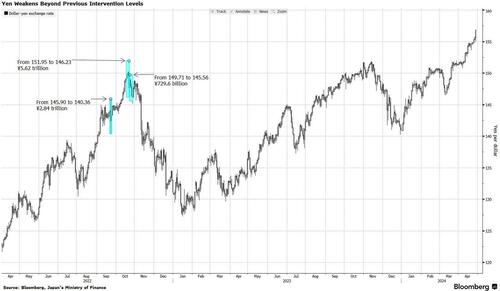
European stocks rose along with US equity futures: the Stoxx 600 is up 0.6%, with technology and construction sectors leading gains, while chemicals and insurance subgroups are the biggest losers. Thyssenkrupp shares jumped after Czech billionaire Daniel Kretinsky’s EP Corporate Group agreed to buy a fifth of the German manufacturer’s troubled steel unit. Miners outperformed as copper hit $10,000 a ton for the first time in two years. Here are the biggest movers Friday:- Saint-Gobain shares gain as much as 6.3% after the French building-materials producer reported first-quarter sales that were slightly above expectations, according to Oddo. Separately, management is seeing signs of bottoming out for new build markets in Europe
- NatWest rises as much as 5.2% after net interest income and pretax operating profit for the first quarter beat the average analyst estimate
- Amundi soars 7%, most in two years, after the French asset manager reported net inflows for the first quarter that beat the average estimate. Citi analysts expect mid-single digit consensus upgrades. KBW called the results “solid.”
- Electrolux shares gain as much as 7%, the most since December, after first-quarter figures from the Swedish maker of domestic appliances weren’t as bad as feared, with an operating loss of SEK720 million, versus an expected SEK809 million
- Jeronimo Martins soars most in six months after Ebitda margin erosion in 1Q was smaller than analysts expected, showing that Portuguese retailer can withstand competition pressure in Poland as well as negative impact from slowing inflation
- Airbus shares fall as much as 3% to the lowest since early March after its first-quarter results were significantly below estimates, even as the planemaker reiterated its full-year targets
- IMCD’s shares sink as much as 10%, the most since March 2020, after the specialty chemicals and ingredients company reported first-quarter operating Ebita that missed estimates. ING says the story was “underlying quite weak.”
- Hexagon shares fall as much as 4.4% after the software firm reported sales and operating profit that missed estimates, while saying that demand will remain mixed in the near term
- ConvaTec Group shares decline as much as 7.2% after the medical equipment maker was downgraded to reduce by analysts at Peel Hunt, which has growing concerns about its wound care products in the US
- Yara shares fall as much as 6.9%, the lowest intraday since May 2020, after the Norwegian agricultural chemicals firm reported adjusted Ebitda below estimates
Earlier in the session, Asian stocks rose, headed for their best week since November, as investors cheered upbeat earnings from technology firms and sentiment on China continued to improve. Japanese stocks rose as the Bank of Japan left interest rates unchanged. The MSCI Asia Pacific Index rose 0.8%, with TSMC and Tencent among the biggest boosts. The gauge extended its weekly gains to more than 3%. Stocks rose in mainland China and Hong Kong, with the Hang Seng China Enterprises Index poised for its best week since April 2015. Signs of an improving Chinese economy, better corporate earnings and Bejing’s support measures have spurred inflows from global funds.
- Hang Seng and Shanghai Comp. were underpinned by strength in tech and property, while the constructive mood was also facilitated by a meeting between US Secretary of State Blinken and Chinese Foreign Minister Wang where it was stated that the US-China relationship has stabilised although negative factors are building.
- ASX 200 underperformed after the prior day's losses caught up with the index on return from holiday.
- Nikkei 225 was initially choppy and briefly dipped into negative territory as participants braced for the BoJ policy announcement and whether the central bank flags a reduction in bond buying, but then surged as the central bank kept policy settings unchanged and refrained from any major hawkish surprises.
In FX, the dollar was slightly lower, as all the action was in the Japanese yen which cratered to a fresh 34 year low near 157 versus the dollar after the Bank of Japan stood pat on interest rates and Governor Ueda did little to push back against recent weakness in the press conference. USD/JPY did swing sharply lower to sub-155 before swiftly rebounding in jittery trading amid heightened speculation that authorities may intervene in the market.
In rates, treasuries climbed, paring some of Thursday’s post-data drop. US yields are richer by up to 2bp across long-end of the curve with 5s30s spread around 8bp, tighter by around 1bp on the day; 10-year yields around 4.685%, down 1.5bp on the day with bunds outperforming by 1bp in the sector.
In commodities, oil prices advance, with WTI rising 0.4% to trade near $83.90 a barrel. Spot gold rises 0.7% to around $2,350/oz. Copper hit $10,000 a ton for the first time in two years.
Looking at today's calendar, the US session highlight is the March personal income/spending (8:30am); we algo get the April revised University of Michigan sentiment (10am) and April Kansas City Fed services activity (11am). Fed members are in self-imposed quiet period ahead of May 1 policy announcement
Market Snapshot
- S&P 500 futures up 0.8% to 5,121.00
- STOXX Europe 600 up 0.6% to 505.47
- MXAP up 0.7% to 172.65
- MXAPJ up 0.8% to 536.04
- Nikkei up 0.8% to 37,934.76
- Topix up 0.9% to 2,686.48
- Hang Seng Index up 2.1% to 17,651.15
- Shanghai Composite up 1.2% to 3,088.64
- Sensex down 0.7% to 73,833.99
- Australia S&P/ASX 200 down 1.4% to 7,575.91
- Kospi up 1.1% to 2,656.33
- German 10Y yield little changed at 2.60%
- Euro up 0.2% to $1.0748
- Brent Futures up 0.2% to $89.21/bbl
- Brent Futures up 0.2% to $89.21/bbl
- Gold spot up 0.6% to $2,347.56
- US Dollar Index down 0.10% to 105.49
Top Overnight News
- BOJ leaves rates unchanged, as expected, and retained its guidance from Mar about purchasing gov’t bonds (there had been some speculation of a taper or a hint of one). WSJ
- Japan’s Tokyo CPI for April cools far more than anticipated, coming in +1.8% ex-food/energy vs. the Street +2.7% and down from +2.9% in March. BBG
- China’s foreign minister says the relationship w/the US was starting to stabilize but that “negative factors” were increasing. NBC News
- Eurozone inflation expectations over the next 12 months ticked down to 3% (from 3.1%), hitting the lowest level since Dec 2021. ECB
- The ECB is likely to need extra interest rate cuts if global borrowing costs are pushed up by the US Federal Reserve maintaining its restrictive monetary policy stance, a top eurozone policymaker has said. Fabio Panetta, head of Italy’s central bank, said that if the Fed keeps rates on hold longer than markets expect, or even raises them, it would be “likely to reinforce the case for a rate cut [by the ECB] rather than weakening it”. FT
- Donald Trump’s allies are quietly drafting proposals that would attempt to erode the Federal Reserve’s independence if the former president wins a second term, in the midst of a deepening divide among his advisers over how aggressively to challenge the central bank’s authority. WSJ
- Walmart's CEO says inflation continues to cool: “At Walmart, we are now seeing prices that are in line with where they were 12 months ago. I haven’t been able to say that for a few years now. The last few weeks, we've taken even more prices down in areas like produce and meat and fresh food”. ABC News
- Annualized US core PCE inflation accelerated to 4.5% over the last three months, but underlying trends are less alarming. The Q1 acceleration mostly reflected one-off surprises in acyclical categories where costs pass-through with long lags, and forward-looking indicators are at target-consistent levels. Progress therefore appears delayed but not reversed, and we forecast that core PCE inflation will slow to 2.2% on a sequential annualized basis in 2024Q2-Q4. GIR
- Microsoft and Alphabet jumped premarket after stellar earnings and expectations for a surge in cloud revenue fueled by AI demand. Execs at both companies said they plan to spend more on AI. BBG
Earnings
- Alphabet Inc (GOOGL) Q1 2024 (USD): EPS 1.89 (exp. 1.51), Revenue 80.54bln (exp. 78.59bln); board authorised Co. to repurchase up to an additional 70bln and declared a cash dividend of 0.20/shr. Shares +11.5% in pre-market trade
- Microsoft Corp (MSFT) Q3 2024 (USD): EPS 2.94 (exp. 2.82), Revenue 61.86bln (exp. 60.8bln). Shares +4.1% in pre-market trade
- Intel Corp (INTC) Q1 2024 (USD): Adj. EPS 0.18 (exp. 0.14), Revenue 12.70bln (exp. 12.78bln). Shares -7.5% in pre-market trade
- Snap Inc (SNAP) Q1 2024 (USD): Adj. EPS 0.03 (exp. -0.05), Revenue 1.19bln (exp. 1.12bln). Shares +23.5% in pre-market trade
- TotalEnergies (TTE FP) Q1 (USD): Adj. Net 5.11bln (exp. 5bln). Adj. EBITDA 11.5bln (exp. 11.1bln). Plans a USD 2bln share buyback Q2; Cash flow from operating activities 2.2bln (prev. 5.1bln Y/Y); Dividend +7% Y/Y
- Airbus (AIR FP) Q1 24 (USD): Adj. EBIT 600mln (exp. 789mln), Revenue 12.80bln (exp. 12.87bln), Gross Orders 170 (prev. 156), Net Orders 170 (prev. 142), Deliveries 142. Reaffirms 2024 guidance.
A recap of overnight news courtesy of Newsquawk
APAC stocks were mostly higher as the region digested recent market themes including disappointing US data, strong big tech earnings and the BoJ policy announcement. ASX 200 underperformed after the prior day's losses caught up with the index on return from holiday. Nikkei 225 was initially choppy and briefly dipped into negative territory as participants braced for the BoJ policy announcement and whether the central bank flags a reduction in bond buying, but then surged as the central bank kept policy settings unchanged and refrained from any major hawkish surprises. Hang Seng and Shanghai Comp. were underpinned by strength in tech and property, while the constructive mood was also facilitated by a meeting between US Secretary of State Blinken and Chinese Foreign Minister Wang where it was stated that the US-China relationship has stabilised although negative factors are building.
Top Asian News
- Chinese Foreign Minister Wang said in a meeting with US Secretary of State Blinken that the China-US relationship has stabilised but negative factors are building, while he added that sliding into conflict with the US would be a lose-lose situation that they ask the US not to interfere with China's internal affairs. Furthermore, Blinken said there is no substitute for face-to-face diplomacy and they need to avoid miscalculations, while he hopes the US and China can make progress on agreements, citing fentanyl, military-to-military ties and AI risks.
- US is pushing allies in Europe and Asia to tighten restrictions on exports of chip-related technology and tools to China amid rising concerns about Huawei's development of advanced semiconductors, according to FT sources. US wants Japan, South Korea, and the Netherlands to use existing export controls more aggressively, including stopping engineers from their countries servicing chipmaking tools at fabs in China.
- ByteDance reportedly prefers shutting down the app rather than a sale if it exhausts all legal options and the algorithms TikTok relies on are deemed core to ByteDance’s overall operations, making the sale of the app unlikely, according to Reuters sources.
European bourses, Stoxx 600 (+0.5%) are entirely in the green, though trade has been contained at session highs, as participants await March's US PCE at 13:30 BST. European sectors are almost entirely in the green, with the exception of Chemicals, following poor IMCD (-9.1%) results. Tech tops the pile, with optimism lifted following strong large-cap Tech earnings in the US. US Equity Futures (ES +0.7%, NQ +0.9%, RTY +0.1%) are entirely in the green, with the NQ outperforming, benefitting from significant pre-market strength in both Google (+11.1%) and Microsoft (+3.6%), after reporting strong earnings after-market.
Top European News
- ECB's Panetta said they must weigh the risk of monetary policy becoming too tight, while he added that timely and small rate cuts would counter weak demand and could be paused. Furthermore, he stated that hesitations in adjusting rates would hurt investment and productivity, while large rate cuts could create a credibility issue.
- ECB Consumer Inflation Expectations survey (Mar) - 12-months ahead 3.0% (prev. 3.1%); 3-year ahead 2.5% (prev. 2.5%). Economic growth expectations for the next 12 months 1.1% (prev. -1.1%)
- SNB Chair Jordan said SNB has been successful in fight against inflation; uncertainty remains elevated and shocks can occur at and time
BOJ
- BoJ kept its policy settings unchanged with the short-term interest rate target at 0.0%-0.1%, as expected, with the decision made unanimously, while it dropped the reference from the statement that it currently buys about JPY 6tln worth of JGBs per month but stated that it will conduct JGB, commercial paper and corporate bond buying in line with the decision in March. BoJ said it must be vigilant to FX and market moves and their impact on the economy and prices but noted no excessive behaviour is seen in Japan's asset market and financial institutions' practices. Furthermore, it stated that if trend inflation rises, the BoJ will likely adjust the degree of monetary easing but also added to expect accommodative monetary conditions to continue for the time being. In terms of the latest Outlook Report, Board Members' Real GDP median forecast for Fiscal 2024 was cut to 0.8% from 1.2% but the Fiscal 2025 median forecast was maintained at 1.0%, while the Core CPI Fiscal 2024 median forecast was raised to 2.8% from 2.4% and Fiscal 2025 median forecast was raised to 1.9% from 1.8%.
- PRESS CONFERENCE: BoJ Governor Ueda said easy financial conditions will be maintained for the time being; Weak JPY so far is not having a big impact on trend inflation. Difficult to gauge timing of future rate hikes. Weak JPY so far is not having a big impact on trend inflation. Reduction in JGB buying in the future is in sight. Will not comment on FX moves
FX
- USD is around flat, and holding within a 105.40-71 range. USD was initially being propped up by JPY softness post-BoJ, although that has abated somewhat, amid Yen intervention speculation.
- JPY is the clear laggard across the majors following the BoJ policy announcement overnight, which provided no hawkish surprise. USD/JPY took another leg higher amid BoJ Ueda's press conference, before being slapped down to sub-155 levels, a few hours later. Some will likely view the move as intervention but we are yet to see any official confirmation of this.
- EUR is flat vs. the USD and breached yesterday's 1.0740 best. If the pair ventures higher, 1.0756 from April 11th is the next potential target.
- Antipodeans are firmer vs. the USD and outmuscling peers alongside the favourable risk environment. AUD/USD has gained a firmer footing above its 200 and 50DMAs at 0.6526 and 0.6532 respectively with focus now on a potential approach of 0.66
- PBoC set USD/CNY mid-point at 7.1056 vs exp. 7.2449 (prev. 7.1058).
Fixed Income
- USTs are a touch firmer after yesterday's data induced losses, which sent the Jun'24 UST to a contract low of 107.04. Today's trade has been contained within a 107.04-108.01 range, with all eyes on March's US PCE metrics later.
- Bund price action has been following USTs and attempting to recoup recently lost ground which has been inspired this week by a combination of better data and speak from hawkish ECB members. Bunds are so far respecting yesterday's 129.53-130.38 range.
- Gilts are firmer and in-fitting with global peers in an attempt to claw back recent losses. However, with a lack of UK-specific drivers, UK paper will likely remain at the whim of global peers.
Commodities
- A relatively tame session thus far for the crude complex following Thursday's choppy trade, as participants await monthly US PCE metrics; Brent Jun'24 range between 89.08-69/bbl.
- Precious metals are firmer amid the softer Dollar and ahead of the US PCE data, with spot silver narrowly leading vs spot gold. XAU topped yesterday's peak (USD 2,344.93/oz) to trade in a current intraday range between USD 2,326.36-2,352.30/oz.
- Base metals are stronger across the board amid bullish momentum after copper crossed key levels, with the broader complex underpinned by the softer Dollar and broader risk appetite; 3M LME copper is posting gains of over USD 100/t at the time of writing after mounting the key USD 10,000/t mark to levels last seen in 2022.
- India Oil Minister said cartel of oil producers are responsible for current volatility in the market; oil producers are cutting down and holding back production, according to ETNow.
Geopolitics: Middle East
- "US Secretary of State Blinken to visit Israel on Tuesday", according to Sky News Arabia
- Hezbollah said it shelled an Israeli force with artillery at the site of Al-Malikiyah and achieved a direct hit, according to Al Jazeera.
Geopolitics: Other
- US official said the US could announce as soon as Friday USD 6bln in new weapon purchases for Ukraine.
- North Korean leader Kim supervised the test-firing of multiple launch rockets, according to KCNA.
- China's Defence Ministry said Chinese and French militaries established a dialogue mechanism for cooperation between theatre commands, according to Reuters.
US Event Calendar
- 08:30: March PCE Deflator MoM, est. 0.3%, prior 0.3%
- March PCE Core Deflator MoM, est. 0.3%, prior 0.3%
- March PCE Deflator YoY, est. 2.6%, prior 2.5%
- March PCE Core Deflator YoY, est. 2.7%, prior 2.8%
- 08:30: March Personal Income, est. 0.5%, prior 0.3%
- March Personal Spending, est. 0.6%, prior 0.8%
- March Real Personal Spending, est. 0.3%, prior 0.4%
- 10:00: April U. of Mich. Sentiment, est. 77.9, prior 77.9
- April U. of Mich. Current Conditions, prior 79.3
- April U. of Mich. Expectations, prior 77.0
- April U. of Mich. 1 Yr Inflation, prior 3.1%
- April U. of Mich. 5-10 Yr Inflation, est. 3.0%, prior 3.0%
- 11:00: April Kansas City Fed Services Activ, prior 7
DB's Jim Reid concludes the overnight wrap
It’s been a volatile 24 hours in markets, but in spite of a selloff yesterday, there’s increasing positivity this morning thanks to strong results from Microsoft and Alphabet after last night’s close. Both companies exceeded revenue and earnings expectations, with Alphabet seeing the larger beat on profitability, as their growth was boosted by demand for cloud computing and AI-related offerings. That’s seen Alphabet rise by over 11% in after-hours trading, while Microsoft is up more than -4%, having both been down in the main session yesterday. In turn, futures on the S&P 500 are currently up +0.81%, which is a significant turnaround from yesterday, as the index closed -0.46% lower, and that was only after recovering from initial losses that had pushed it down -1.60%.
That positivity has continued into Asian markets overnight, which comes as the Bank of Japan left their interest rates unchanged at their latest meeting. That’s seen the Japanese Yen weaken further, and it’s currently trading at 156.11 per dollar, which is its weakest level since 1990. Front-end government bond yields have also fallen overnight in Japan, with the 2yr yield down -0.7bps to 0.29%. And for equities, all the major indices have risen, including the Nikkei (+0.74%), the KOSPI (+1.10%), the Hang Seng (+1.98%), the CSI 300 (+1.03%) and the Shanghai Comp (+0.79%).
Before that overnight reversal, markets had struggled yesterday, as challenging data and poor earnings led to a notable selloff. That meant investors pushed back the timing of rate cuts yet again, and the 2yr Treasury yield (+7.1bps) closed at 4.998%, so almost at 5% for the first time since mid-November. That was mainly driven by the Q1 US GDP release, which had the unfortunate combination of a downside surprise on growth, and an upside surprise on inflation. As we found out in 2022, that stagflationary mix can potentially be a bad recipe for markets, so it wasn’t a surprise to see equities and bonds lose ground simultaneously even if equities have since been busy making up their initial losses.
In terms of the details, growth came in at an annualised rate of +1.6% (vs. +2.5% expected), which is the slowest growth since Q2 2022. But more alarmingly for markets, core PCE surprised on the upside, with an annualised rate of +3.7% in Q1 (vs. +3.4% expected). Headline PCE was also strong, at +3.4% in Q1, and core services ex housing (a measure Fed Chair Powell has cited in the past) was at +5.1%. So whichever way you crunch the numbers, this clearly isn’t the sort of inflation momentum where the Fed could be comfortable cutting rates. We’ll get the monthly US PCE numbers for March today within the spending report as well. If you’re looking for positives on growth, final private domestic sales came in at 3.1%, with the slowing in headline GDP growth coming from net exports, inventories and government spending. So domestic demand still holding up well. However you could argue that just ties in with the strong inflation component.
Unsurprisingly, that release meant markets dialled back the odds of rate cuts anytime soon. For instance, the chance of a rate cut by the July meeting fell from 50% the previous day to 34% afterwards. And for the year as a whole, futures are now pricing in just 34bps of cuts by the December meeting, down from 43bps the previous day and 67bps at the start of the month. So futures are now pricing the most hawkish profile we’ve seen to date in this hiking cycle, at least in terms of where rates are set to be by the end of 2024. Indeed for the first time, the first 25bp cut isn’t fully priced in until the December 2024 meeting.
With investors pricing out rate cuts, US Treasuries slumped and yields hit their highest levels of 2024 so far. In particular, the 2yr Treasury yield (+7.1bps) saw a closing value of 4.998%, having reached 5.02% intra-day. And similarly, the 10yr yield was up +6.2bps to 4.70%, although this morning it’s since come down -1.0bps to 4.69%. Bear in mind that just after Christmas, the 10yr yield hit an intraday low of 3.78%, so it’s moved up by almost 100bps from that point now. At the same time, there was a decent spike in real yields, with the 10yr real yield (+4.4bps) reaching a post-November high of 2.28%.
That trend was echoed in Europe, where investors lowered their expectations for ECB rate cuts this year, and now see just 68bps of cuts by December’s meeting, down -5.5bps on the day. As in the US, that meant 10yr yields hit new YTD highs, with those on 10yr bunds (+4.1bps) up to 2.63%, 10yr OATs (+3.7bps) up to 3.13%, and 10yr gilts (+2.8bps) up to 4.36%. For now at least, a June rate cut from the ECB is still seen as an 84% probability, but from Monday we’ll start to get the flash CPI prints for April, so it’ll be interesting to see if that changes anything.
For equities, this backdrop meant it was a tough day across the board even if the recovery was steady as the US session progressed. All the major indices fell, including the S&P 500 (-0.46%), the NASDAQ (-0.64%) and the Dow Jones (-0.98%). Rebounds by Nvidia (+3.71%) and Tesla (+4.97%) helped limit and reverse the earlier larger losses. But Meta (-10.56%) was the worst performer in the entire S&P 500 following its earnings release the previous day, meaning that the Magnificent 7 (-1.19%) underperformed despite the gains for Nvidia and Tesla. IBM (-8.25%) lost significant ground after its release the previous evening as well.
Over in Europe, the STOXX 600 (-0.64%) also saw a decent decline, although the FTSE 100 (+0.48%) was again an exception as it hit another record high, aided by a surge in Anglo American (+16.10%), which was the index’s best performer after BHP proposed a takeover. The proposed deal would bring together two of the world’s largest mining companies and create a clear number one globally. Our mining team think the deal rationale is about global scale and growth in copper, a structurally tight commodity which is key to future global electrification. Copper prices have risen by +17.6% so far this year, and overnight they’re trading at their highest level since April 2022. The mining team’s note (link here) runs through the deal terms and other talking points.
Looking at yesterday’s other data, the US weekly initial jobless claims fell to 207k in the week ending April 20 (vs. 215k expected), which is their lowest level in a couple of months. Otherwise, pending home sales grew by +3.4% in March (vs. +0.4% expected), reaching a 13-month high.
To the day ahead now, and data releases include US PCE inflation for March, along with personal income and personal spending. In addition, there the University of Michigan’s final consumer sentiment index for April, and in the Euro Area, we’ll get the M3 money supply for March. Finally, earnings releases include Exxon Mobil and Chevron.
-
Site: AsiaNews.itIn its latest annual report, Amnesty International calls for full abolition of the death penalty. With the 2018 moratorium Malaysia has made progress, but that's not enough. Between July 2023 and January 2024, the death penalty was pronounced 26 times. For lawyer Michael Kong, 'open public discussions about justice' are needed.
-
Site: PaulCraigRoberts.org
The Stark Decline of the Human Species
George Bernanos wrote that humanity’s destruction would come from weakness and “the lack of responsibility of modern man, his submissive acceptance of any order from above. The horrors that we have seen, the still greater horrors we shall presently see, are not signs that rebels, insubordinate, untamable men are increasing in number throughout the world, but rather that there is a constant increase in the number of obedient, docile men.” The worldwide docile response to the lockdowns and mandates shows the submissive acceptance of tyranny by present day peoples.
Medical Scientists Conclude that the Covid mDNA “vaccines” caused 115,000 excess deaths in Japan from cancers caused by the “vaccine”
https://www.zerohedge.com/covid-19/excess-deaths-japan-hit-115000-following-3rd-covid-shot-new-study-explains-whyRemember: The vaccine is safe and will protect you
Steep rise in rate of stillbirth among young women in Alberta – Alberta government accidentally admits a huge rise in stillbirths in young Alberta women – up to 55% rise in stillbirths in 2023
https://makismd.substack.com/p/steep-rise-in-rate-of-stillbirth?utm_campaign=email-post&r=dx5km&utm_source=substack&utm_medium=emailPoland is going to round up military age Ukrainians and send them back to fight so that more white men can be killed.
https://www.pravda.com.ua/eng/news/2024/04/24/7452830/A black uses AI to frame a white school principal
AI permits the creation of false evidence. The Justice (sic) Department will soon be using it in its political trials.
https://twitter.com/EndWokeness/status/1783613311403143210
Humans persist in creating technologies that blur the distinction between fact and fiction. This is called “progress.”Mary Talley Bowden, MD, is an example of a non-submissive human:
Mary Talley Bowden V. Texas Medical BoardA long-awaited hearing pitting the State of Texas against a popular doctor was scheduled to kick off via Zoom next week but has again been delayed. At issue, reports Daniel Greer, is not just Mary Talley Bowden’s medical license but medical freedom in general.
The Texas Medical Board has been threatening to revoke Dr. Mary Talley Bowden’s license after receiving complaints that she refused to follow government-mandated treatment protocols during the 2020 COVID-19 pandemic. In June 2023, the TMB filed a complaint against Dr. Bowden, alleging unprofessional conduct and violations of the standard of care… despite her treating 6,000 COVID patients with zero deaths.
Dr. Bowden believes the medical board’s actions against her are retaliatory and an attempt to silence her views.
These fights have been costly to Bowden. She recently revealed the financial toll of defending herself has exceeded $100,000. According to the Texas Medical Board, their costs total just $17,593.20.
The disparity in expenditures is a helpful reminder that when the state is weaponized against citizens, it has unlimited resources, and the process is often the punishment.
https://blast.texasscorecard.com/t/d-e-ejttjtk-dryudktlut-tl/As this report makes clear, the Texas Medical Board is totally corrupt and nothing but a shill for tyranny and Big Pharma’s profits.
-
Site: PaulCraigRoberts.org
-
Site: PaulCraigRoberts.org
Biden: White Americans Are the Threat
Paul Craig Roberts
The Main Goal of the Biden Regime Is to Sell-out the Majority White American Population and to declare them as a menace.
Tucker Carlson points out that president Biden, illegitimately in office due to the theft of the 2020 election, has as president of the United States defined America’s majority white population as the major cause of racism and a threat to national unity. Note: it is the majority that is the threat.
Yet, tens of millions of dumbshit white Americans designated as America’s worst threat by Biden vote for him.
What future can such a collection of morons have?
A white heterosexual who votes for Biden is expressing a death wish.
It is the US whose Democrat Government is alienated from its own white majority population that intends to fight wars against Russia, Iran, and China.
This is insanity. Who is going to fight these wars for Biden? The answer is Europeans and the immigrant-invaders into America thanks to Biden’s open border policy. Like Rome in its own self-inflicted decay, the US will be dependent on troops from the immigrant-invaders overrunning its own borders to fight its wars abroad in defense of the borders of foreign countries.
There is no discussion of this whatsoever.
https://twitter.com/TuckerCarlson/status/1783254594480730380
-
Site: Rorate CaeliThe Corner Cabinet magazine is organizing a conference in London on June t1st hat will delve into Chesterton's enduring influence on literature, philosophy and Catholic thought. The conference promises to be a stimulating event featuring esteemed speakers including Fr. David Sherry, and Kennedy Hall, as well as engaging discussions on Chesterton’s legacy and relevance in today’s world:New Catholichttp://www.blogger.com/profile/04118576661605931910noreply@blogger.com
-
Site: Novus Motus LiturgicusMarcellinus ruled the Roman Church for nine years and four months (really 296-304). By the order of Diocletian and Maximian (during the last and greatest Roman persecution, 303-6), he was seized and brought to sacrifice, and when he did not agree, and for this had to undergo torments of various kinds, out of fear of suffering he offered two grains of incense in sacrifice. This was a cause of Gregory DiPippohttp://www.blogger.com/profile/13295638279418781125noreply@blogger.com0
-
Site: Zero Hedge"Our Enemy, The Fed"Tyler Durden Fri, 04/26/2024 - 07:20
Authored by George Ford Smith via The Mises Institute,
The first thing to know about Dr. Thomas E. Woods, Jr.’s’ book Our Enemy, the Fed is he’s giving it away. Click the link, get your copy and read the whole book. Clearly, such intellectual charity is not only rare but in the educational spirit of Mises.org. The subject matter is light-heavy but Woods, author of the bestseller Meltdown (reviewed here), navigates it with the smooth skill of a master, making the reader experience satisfying from beginning to end.
The title reflects another insight, paralleling as it does Albert Jay Nock’s Our Enemy, the State. Most of us were raised to believe government and its agencies serve our best interests. As libertarian scholarship has shown the truth is the exact opposite, particularly with government’s sleazy relationship with money and banking.
Admittedly, it’s a hard idea to accept since it involves a pernicious breach of trust, but Woods makes it abundantly clear. To our overlords we are easily-duped chattel.
Until Ron Paul decided to run for president and his End the Fed came along in 2009, the general public was mostly blind to the Fed’s existence. Austrians aside, the few who knew something about it — mostly university-trained economists on the take from the Fed — considered it a vital part of an advanced industrial economy. Yet the Fed had been around for 96 years when Dr. Paul’s book emerged. Given that it’s in charge of the money we use how did it remain in the shadows for tax-burdened citizens for nearly a century? What’s up with that?
The Federal Reserve Bank of St. Louis tells us the Fed’s congressional assignment is “to promote maximum employment and price stability.” (Bold in original) For these it talks about interest rates, and its aim is to increase the money supply so that prices rise gently at or around a 2 percent rate.
How gentle is a two percent rate? After 10 years of two percent monetary inflation, it would take $121.90 to buy what $100 bought in year one. But that’s over a decade, and you might not notice it unless you’re one of the hungry poor not on welfare. The Fed’s inflation of the money supply has been ongoing since it began operations in 1914, draining 96 percent of the dollar’s purchasing power.
On what planet is a 96 percent devaluation considered stability? Its real purpose is to inflate then assure us it makes good sense. Never mind the boom - bust cycle it creates along with the debauchery of our currency. We’re being gaslighted. Where did all the newly-created money go?
Dr. Paul, who had a long career in Congress whose confrontations with Fed Chairmen Alan Greenspan and Ben Bernanke have become legendary in libertarian circles, tells us:
Law permits this highly secretive, private bank to create credit at will and distribute it as it sees fit.
The chairman of the Federal Reserve can blatantly inject in a public hearing that he has no intention of revealing where the newly created credit goes and who benefits. When asked, he essentially answered, “It’s none of your business,” saying that it would be “counterproductive” to do so. [My italics]
The picture I get is of people in a hideout somewhere — in this case, the FOMC meeting in the Eccles building in Washington, D.C. — cranking out money then injecting it into the economy in some mysterious manner, while telling us in Keynesian doublespeak their operations keep us safe and prosperous.
Is it really hard to fathom that those in charge might be up to no good?
Woods comes out swinging
After defining the Federal Reserve System — the Fed — as the American central bank enjoying “a government-granted monopoly on the creation of legal-tender money,” Woods proceeds to evaluate the Fed from a broad or macro perspective.
What exactly did the Fed fix? Christina Romer who served under Obama as Chair of his Council of Economic Advisors found that “recessions were in fact not more frequent in the pre-Fed than the post-Fed period.” Even comparing the periods of 1796-1915 to post-WW II — thus omitting the Great Depression of 1930-1945 — “economist Joseph Davis finds no appreciable difference between the length and duration of recessions as compared to the period of the Fed.”
Woods takes us back through American history to see how banking and credit developed. Government, which has no money of its own, befriends ones that have it. During the period between the expiration of the first Bank of the US and the creation of the Second Bank of the US — 1811-1817 — the government granted banks the privilege of expanding credit unsecured by deposits while allowing them to tell depositors attempting to withdraw their money to “come back in a couple of years.” While banks could be charged with legal counterfeiting and embezzlement, Woods does not use the terms. In fact, nowhere in the book does he use the words “counterfeit” or “embezzle.”
When the Second Bank of the US started inflating in 1817 it created the Panic of 1819. He writes:
The lesson of that sorry episode — namely, that the economy gets taken on a wild and unhealthy ride when the money supply is dramatically and artificially increased and then suddenly reduced — was so obvious that even the political class managed to figure it out.
Many inflationists before the panic became hard-money believers after. Condy Raguet and Daniel Raymond, a disciple of Alexander Hamilton, became hard-money advocates and wrote books on economics. John Quincy Adams cited the hard-money Bank of Amsterdam “as a a model to emulate.”
But the inflationists persisted and pushed for more government intervention, and Unit banking in particular:
In the nineteenth century, nearly all American states instituted a regulation known as unit banking, which limited all banks to a single office. No branch banking was allowed, whether intrastate or interstate. The obvious result was a very fragile and undiversified banking system in which banks could be brought to ruin if local conditions turned sour.
Fractional-reserve banking is a major cause of bank panics. But the US went further. Other countries did not “cripple their banking systems” with unit banking laws. Canada, in particular, had no unit banking laws and no banking panics. The Bank of Canada did not emerge until 1934:
As Milton Friedman was fond of pointing out, although the Great Depression claimed over 9,000 American banks, the number of banks that failed in Canada at that time was zero. American bank panics, it turns out, were in large part the result of government intervention — in the form of unit banking — in the first place.
Yet it was the market and the imposed pseudo-gold standard that took the blame, and Americans got Hoover’s meddling then FDR’s New Deal.
Later in the book Woods mentions the hands-off approach to the depression of 1920-1921, “which saw unemployment shoot up to 12.4 percent and production decline by 17 percent. Wholesale prices fell by 56 percent.” And the Fed kept its printing press quiet. According to the National Bureau of Economic Research the depression was over by the summer of 1921.
Falling prices are bad?
One of the strongest parts of Woods’ book is his treatment of deflation — falling prices. It is only in the inflationary world of larcenous economics that falling prices are the “It” to be avoided.
A few of the points he makes:
-
Increasing the money supply to support increased production is a fallacy. “Any supply of money can facilitate any number of transactions.”
-
The money supply under a hard money system grows “relatively slowly, and the supply of other goods and services increases more rapidly. With these goods and services more abundant with respect to money, their prices fall.”
-
The claim that people would stop buying things if they knew prices would fall ignores the fact that people “value goods in the present more highly than they do the same goods in the future. This factor offsets the desire to wait indefinitely for a lower price.”
-
If deflation is anticipated entrepreneurs and the firms they deal with would adjust their bids accordingly.
-
With the increase in money’s purchasing power people could save simply by hoarding.
-
Who’s hurt the most by deflation? The power centers in society — government and Wall Street. We hear hysteria over deflation because it hurts the establishment the most, “and only the mildest concern about inflation, which hurts everyone else.”
Conclusion
Tom Woods has published another gem and is giving it away. The war we’re fighting now depends for its outcome on sound information and, as always, personal integrity. Never forget, the Fed must go. His book provides much of the intellectual ammunition needed to neutralize the enemy and avoid repeating the mistakes that brought us this mess in the first place.
-
-
Site: Mises InstituteWhy have some Americans opposed this nation’s involvement in foreign wars? According to Jacob Heilbrunn of The National Interest, it is because those Americans love bloody dictators like Adolph Hitler.
-
Site: Mises InstituteWhy have some Americans opposed this nation’s involvement in foreign wars? According to Jacob Heilbrunn of The National Interest, it is because those Americans love bloody dictators like Adolph Hitler.
-
Site: The Josias
Urban Hannon returns to the podcast to join Fr. Jon Tveit and Amanda for a conversation about the virtue of religion—what it is theologically, and what it demands practically of us and our society.
Bibliography
- St. Thomas Aquinas, Summa Theologiae, II-II Q.80-81
- Fr. Franck Quoex, Liturgical Theology in Thomas Aquinas (transl. Zachary Thomas)
- R. Jared Staudt, The Primacy of God: The Virtue of Religion in Catholic Theology
- The Josias Podcast Episode XIX: Justice
Header Image: Jules Breton, The Blessing of the wheat in Artois (1857)
If you have questions or comments, please send them to editors(at)thejosias.com.
Follow us on Twitter and Facebook.
Many thanks to our generous supporters on Patreon, who enable us to pay for podcast hosting. If you have not yet joined them, please do so. You can set up a one-time or recurring donation in any amount. Even $1 a month would be splendid.
-
Site: Zero HedgeUK Defense Chief Says Ukraine To Increase Long-Range Strikes In RussiaTyler Durden Fri, 04/26/2024 - 06:55
Just as President Biden was signing into effect the newly approved foreign defense package which includes $60 billion for Ukraine, the United Kingdom also rolled out its own massive aid package (though paling in comparison), first unveiled Tuesday.
Britain announced its single largest aid package for Ukraine yet, at the equivalent of $620 million (£500 million). According to UK NATO officials, the arms include Storm Shadow missiles among a total of 1,600 strike and air defense missiles, four million rounds of ammo, 60 boats, and over 400 vehicles.
Even though the White House is busy cautioning that in the coming months Russia is likely to make more gains on the front lines, according to fresh words of Jake Sullivan, British leadership is still talking about "winning".
 Head of the UK military, Admiral Sir Tony Radakin, Via The Telegram
Head of the UK military, Admiral Sir Tony Radakin, Via The Telegram
Defense Minister Grant Shapps, for example, had this to say about new aid: "This record package of military aid will give President Zelensky and his brave nation more of the kit they need to kick Putin out and restore peace and stability in Europe."
"The UK was the first to provide NLAW missiles, the first to give modern tanks, and the first to send long-range missiles," he added. "Now, we are going even further. We will never let the world forget the existential battle Ukraine is fighting, and with our enduring support, they will win."
Britain's military leadership is also echoing this optimism, with UK defense chief, Admiral Sir Tony Radakin, telling Financial Times that the West's new infusion of military aid will help Ukraine increase its long-range strikes on Russian territory:
Ukraine is set to increase long-range attacks inside Russia as an influx of western military aid aims to help Kyiv shape the war “in much stronger ways”, the head of the UK military has said.
Admiral Sir Tony Radakin acknowledged the downbeat mood surrounding Ukraine’s defence in an interview with the Financial Times, admitting the country was facing a “difficult” fight to repel advancing Russian forces.
But Britain’s chief of defence, a key figure in the west’s military support for Kyiv, stressed that such a gloomy “snapshot” of the war failed to recognise longer trends more in Kyiv’s favour.
Adm. Radakin continued, "As Ukraine gains more capabilities for the long-range fight . . . its ability to continue deep operations will [increasingly] become a feature" of the war. He emphasized of new weapons systems, "they definitely have an effect."
UK leadership has of late put the country's defense industry on a "war footing" in preparation to support Kiev for the long haul. More of Radakin's words point to escalation (and not negotiations) in the following...
"Don’t expect anyone to say publicly ‘this is the plan’ and A, B and C are now going to happen," he told FT. Some aspect of Ukraine's strategy and operations "will be hidden . . . some will be dictated by a tactical or operational advantage, and some also depends on more foundational aspects," he added.Nowhere in the UK defense chief's interview was acknowledgement that these policies could lead to runaway escalation, and an eventual direct confrontation between nuclear-armed powers. The Kremlin has in response vowed that it will take more territory in Ukraine in order to counteract the longer range of NATO missiles.
-
Site: Zero HedgePolish President Admits That Major Infrastructure Project Has Dual Military PurposesTyler Durden Fri, 04/26/2024 - 06:30
Authored by Andrew Korybko via Substack,
Polish President Andrzej Duda revealed in an interview that the Central Communication Port (CPK by its Polish abbreviation) transportation megaproject outside of Warsaw has dual military purposes.
He represents Poland’s prior conservative-nationalist government but remains in office despite the liberal-globalist opposition’s victory at the polls last fall since his term doesn’t expire till next year.
Duda’s latest claim makes Prime Minister Donald Tusk’s decision to pause and audit the CPK even more scandalous.
It was analyzed here at the time that he was economically subordinating Poland to Germany after having already done so on the political and military fronts, which lent credence to conservative-nationalist chieftain Jaroslaw Kaczynski’s warning late last year that Tusk is actually a “German agent”. Tusk then subordinated his country to its neighbor on the educational, judicial, and diplomatic fronts, all of which is being done on the pretext of implementing various “reforms”.
The end result is that Poland now plays an indispensable role in Germany’s “Fortress Europe” that was elaborated upon here, but Duda’s unexpected revelation about the CPK’s dual military purpose might reverse some of the tempo by putting grassroots and external pressure on Tusk to approve the CPK. Most Poles are in favor of this transport megaproject according to the latest polls that Duda’s interlocutor cited, while the US has an interest in using Poland as an anti-Russian military launchpad.
Here's exactly what Duda said according to Google Translate:
“It is no secret to anyone, and I emphasize this: If a situation of potential danger for Poland were to occur, and the relocation of additional allied forces to Poland would be necessary to defend our territory, we do not currently have an airport that would be able to provide such support for the West to quickly come to Poland.”
This reminder is meant to imply that Tusk is harming NATO’s contingency plans for partisan reasons.
It’s also a dog whistle harkening back to what the former conservative-nationalist government’s Defense Minister claimed about his liberal-globalist predecessors regarding Tusk’s defensive plans during his prior two terms in office. Mariusz Blaszczak alleged that Tusk’s government planned to withdraw west of the Vistula River in the political fantasy that Russia invaded Poland until NATO reinforcements arrived and claimed to have the classified documents to prove it too.
Tusk’s previous time in power was marked by the arguably German-advised Russian-Polish rapprochement that was meant to create a “Europe from Lisbon to Vladivostok” during the halcyon era of Russian-EU relations. Those hopes were obviously dashed as everyone now knows, after which Tusk’s conservative-nationalist successors never wasted an opportunity to speculate that his pragmatic policy at the time was due to secret Russian influence over his government.
Blaszczak’s allegation should be seen in that light just like Duda’s reminder should too. Their conservative-nationalist movement sought to exploit political Russophobia in Polish society ahead of the elections to remain in power, but even though that didn’t work, they haven’t learned their lesson and are now trying to employ it yet again in their attempt to return to power one day. That said, it’s indeed important for Poles to be aware of both facts, after which they can make up their own mind.
Revealing allegedly classified details about outdated Polish national defense policy is one thing, while raising awareness of how possibly canceling the country’s largest megaproject in recent memory could impact national security in theoretical contingencies (not to mention killing lots of jobs) is another.
The first disclosure didn’t succeed in reshaping popular perceptions of the liberal-globalists whereas the second stands a greater chance of success of doing so even though it’s too early to conclude that it will.
Another point to pay attention to is that this isn’t the first time that Duda dropped a bombshell about a significant issue. Earlier in April, he told Lithuanian media that foreign companies own most of Ukraine’s industrial agriculture, thus confirming what had previously been reported but denied by the West. He therefore has a habit of being very candid about issues that he sincerely believes are of immense importance for Poland’s objective national interests.
Regardless of whatever the reader’s opinion might be about the likelihood of Duda’s scenario unfolding, which concerns Poland relying on the CPK to serve as the port of entry for a large-scale NATO intervention in the event of a Russian invasion, his point about that megaproject is militarily and strategically sound. It’ll be very difficult for Tusk to argue against it after he himself jumped on the Russia-bashing bandwagon since returning to power and continues fearmongering about its intentions.
He even jumped the shark last month by sensationally claiming that “we are in a pre-war era” that he compared to the run-up to World War II, thus suggesting whether sincerely or not that he supposedly believes that it’s possible for Russia to invade Poland in the coming future. If he ultimately decides to cancel the CPK despite Duda reminding him of its dual military purposes, then he’d discredit his previous fearmongering about Russia, which is the pretext for justifying Poland’s subordination to Germany.
Tusk’s hands might be tied, however, since the combination of grassroots and external (US/NATO) pressure might be enough to get him to reconsider weaponizing the CPK as part of his partisan war against his conservative-nationalist opponents under whom this megaproject was initiated. In any case, Duda inadvertently vindicated those Russian observers who long suspected that the CPK had dual military purposes, thus proving that they were right about Poland’s real plans all along.
-
Site: non veni pacem
Southwest Airlines announced Thursday that the carrier is pulling out of several airports as it contends with financial fallout from Boeing delays. CEO Bob Jordan warned that the carrier has intensified its network optimization efforts to address underperforming markets. As a result, the Texas-based carrier is closing operations at:
- Houston’s George Bush Intercontinental Airport
- Bellingham International Airport in Washington
- Cozumel International Airport in Mexico
- Syracuse Hancock International Airport in New York
Jordan placed some of the blame on Boeing’s manufacturing delays, stating that “the recent news from Boeing regarding further aircraft delivery delays presents significant challenges for both 2024 and 2025.”
While he said it was disappointing to incur a loss in the quarter, the chief executive added that the company is “focused on controlling what we can control and have already taken swift action to address our financial underperformance and adjust for revised aircraft delivery expectations.”
Southwest reported a loss of $231 million, or 39 cents a share, for the quarter.
https://www.fox29.com/news/southwest-airlines-airports-financial-report-april-2024?
-
Site: Zero HedgeSceptical Supreme Court Could Hand Trump Partial Victory In Immunity CaseTyler Durden Fri, 04/26/2024 - 06:01
After two and a half hours, the Supreme Court has finished hearing arguments on whether a former president is immune from criminal prosecution.
Reading the tea-leaves of the comments has left most believing that SCOTUS will fail to grant former President Trump the full immunity he is seeking (choosing instead to narrow the protections for former presidents), but are likely to issue a ruling that could further delay his trial on charges of conspiring to overturn the 2020 election.
That would be a partial win for the former President.
As Axios reports, a definitive ruling against Trump - a clear rejection of his theory of immunity that would allow his Jan. 6 trial to promptly resume - seemed to be the least likely outcome.
-
A majority of the justices seemed inclined to rule that former presidents must have at least some protection from criminal charges, but not necessarily the "absolute immunity" Trump is seeking.
-
The core distinction during oral arguments came down to a president's official vs. unofficial actions. — and which of Trump's efforts to overturn the 2020 election results were official vs. unofficial.
-
The most likely outcome might be for the high court to punt, perhaps kicking the case back to lower courts for more nuanced hearings.
That would still be a victory for Trump, as Sam Dorman reports via The Epoch Times that the outcome of this appeal could delay lower court proceedings in President Trump’s Washington trial as well as his cases in Georgia and Florida. It’s unlikely that the Supreme Court, which is expected to release a decision in June, will write an opinion that delays his ongoing criminal “hush money” trial in New York.
The bottom-line is that no clear, concise majority opinion emerged this morning.
But there may be five justices willing to kick the can down the road - and that's enough for Trump, at least for now.
* * *
The Supreme Court will hear oral argument today over former President Donald Trump’s claim that he’s immune from criminal prosecution for official acts he undertook while in office.
Listen live here (due to start at 1000ET):
LISTEN LIVE: Supreme Court hears case on whether Trump has presidential immunity from prosecution
— PBS NewsHour (@NewsHour) April 25, 2024
https://t.co/zGSnfhqCJqJonathan Turley is live-blogging the hearing on X:
We are off and running on the oral arguments on immunity with John Sauer, former Scalia clerk, arguing for the former president.
...Chief Justice Roberts asked the most poignant question. What if a president appointed an ambassador (a clearly official act) but does so for a bribe? Sauer offered a nuanced point that the bribe itself would not be an official act...
...Justice Sotomayor just hit Sauer and said that Trump was only acting for personal gain and not in the interests or in a function of his government. She is making the slippery slope argument that such immunity would protect the assassination of a president...
...Justice Jackson said that "every president from the beginning of time" understood that they could be prosecuted but they "have continued to function and do their job."...
...Sauer agrees that a president can be prosecuted for private conduct. His point is only that the motivations of official conduct should not be the inquiry of the court. He is doing a good job in maintaining a more nuanced position before the Court...
Justice Jackson gets embarrassed by Trump lawyer John Sauer when she tries to describe America where the president has immunity:
— Greg Price (@greg_price11) April 25, 2024
“The regime you've described is the one we've operated under for over 234 years.” pic.twitter.com/yo15zSUkhA...Justice Alito is asking whether the "robust form of immunity" that he is presenting is really necessary. Alito is exploring the middle ground that some of us have previously discussed...
...Sauer responded again about the danger of allowing motivations to be pursued. Alito suggests that they may insist on objective, not subjective, grounds in making the key determination -- on "purely objective grounds" to determine if this is an official function or issue...
...Interestingly, Alito seems to have answered Sotomayor on a hypothetical in dealing with the term "plausible" . . . an early preview of the conference!
HAHAHA: Justice Alito Exposes Flaws in D.C. Court Opinion Being Used Against Trump After Special Counsel Attorney Claimed Grand Juries Are Layers Of Protection, Says That May Not Be True Since Even Ham Sandwiches Aren't Safe from Grand Jury Indictments! LISTEN pic.twitter.com/ueYZXcdN0r
— Simon Ateba (@simonateba) April 25, 2024... Justice Thomas just asked Sauer if he is challenging the constitutionality of the Special Counsel. Sauer said that they have not come so in this case.
...Sotomayor just referred to the alternative electors as "fake" and Sauer pushed back on the language of the indictment on the record for decision...
Trump Lawyer NUKES Sotomayor's "Fraudulent Electors" Talking Point at SCOTUS
— Kyle Becker (@kylenabecker) April 25, 2024 ...Justice Kagan just asked what would happen if the President order a "coup" and whether it would be an official act. Sauer said that "it would depend." Kagan responded "that sure sounds bad doesn't it?"
"Apply it to the allegations here. What is plausible about the president assisting in creating a fraudulent slate of electoral candidates, assuming you accept the facts of the complaint on their face,… pic.twitter.com/0J0A8KzenMMichael Dreeben is now up for Special Counsel...
...Roberts just slammed the lower court "a former president can be prosecuted for his official acts because the fact of the prosecution means that the former president has acted in defiance of the laws."...
...He said that he is "concerned" because it sounds like "a former president can be prosecuted because he is being prosecuted."...
...Roberts just laid low the appellate decision and Dreeben struggled in defense of it. Roberts responded that, if the Special Counsel does not subscribe to the sweeping decision, why shouldn't the court send it back?
...Roberts said that the D.C. Circuit failed to do a "focused" analysis on these act by adopting a "tautological" standard...
...Gorsuch returned to whether Dreeben is suggesting that immunity questions turn on motivations. Dreeben insists that it is the objection of the conduct rather than the motives...
...Dreeben just conceded that he is not sure if motivations would be relevant in determining immunity in relation in core powers...
...Gorsuch noted however that all presidents use their powers in part out of a desire to get reelected. Dreeben insisted that this all just falls under a different category. Gorsuch is clearly frustrated the lack of clarity if motive are relevant...
...Dreeben just dealt with the drone strikes and said Obama fell in an exception from the murder statute.
...Barrett noted that that sounds a lot like a public versus private distinction...
...This "public authority defense" sounds a lot like arguing a question of motives, again, as raised by the other justices. Dreeben could only say that it was based on "objective" facts.
...Justice Barrett just asked if any immunity would also bar state prosecutions. She suggested that immunity may also protect a president from standing for trial on the state or local levels...
As The Epoch Times' Sam Dorman reports, besides altering longstanding precedent, the decision could bear heavily on, and delay the criminal prosecutions President Trump is facing before the election.
An appeals court in Washington rejected his attempt to claim immunity in the Justice Department’s prosecution of his activity on Jan. 6 and in response to the 2020 presidential election.
The Supreme Court is set to review that decision and potentially establish a broader definition of presidential immunity.
The Supreme Court here has three main options:
-
to uphold the appeal court’s rejection of President Trump’s immunity claims,
-
to accept his claims,
-
or remand the matter back to U.S. District Court Judge Tanya Chutkan with a refined test on what presidential acts are immune from prosecution.
Nixon v. Fitzgerald, a Supreme Court case from 1973, established that presidents enjoy absolute immunity from civil liability for actions that fell within the “outer perimeter” of their official duties.
Experts speculated to The Epoch Times that the justices could extend that same framework to criminal liability.
This is the second major oral argument the justices are hearing about attempts to punish President Trump for his conduct following the 2020 presidential election.
They heard oral argument in February over Colorado’s attempt to disqualify him from the state’s ballot, and issued a unanimous judgment in opposition.
A week before President Trump’s appeal is reaching the Supreme Court, the justices also heard oral argument over how the DOJ applied a financial reform law to Jan. 6 defendants. That same law forms part of DOJ’s indictment against President Trump.
Separation of Powers is a major issue that will likely loom large in both the oral argument and eventual opinion.
President Trump has argued that judicial review of his official acts would be inappropriate, while Special Counsel Jack Smith said granting criminal immunity would upset the balance of power and allow presidents to get away with egregious wrongdoing.
-
-
Site: LES FEMMES - THE TRUTH
-
Site: Zero HedgeChipotle Tells Workers To "Preserve" Chicken Supply As Demand SoarsTyler Durden Fri, 04/26/2024 - 05:45
A surge in restaurant traffic boosted Chipotle Mexican Grill's first-quarter earnings and revenue, topping the average estimate of Wall Street analysts tracked by Bloomberg on Wednesday.
Shares are higher by more than 5% in the cash session on Thursday. However, this note will not expand on earnings. Instead, we will focus on a letter from the company to employees stating: Stop eating chicken during lunch and dinner meals because soaring demand has collided with dwindling poultry supply—and the need to preserve supply urgently.
Bloomberg obtained the letter Chief Restaurant Officer Scott Boatwright sent employees last week. He told them:
"Due to its sustained strong sales we need your help to keep up with our guests' demand for this popular protein option."
Boatwright told store managers and hot-side and cold-side kitchen employees not to order chicken or chicken al pastor with their free or discounted employee meals. Even white-collar Chipotle workers were told not to order chicken.
The message read, "Let's Conserve Our Fan-Favorite Chicken." Execs did not give a timeline for boosting the chicken supply. The letter aimed to "preserve our supply of Adobo Chicken for our guests."
Chief Corporate Affairs and Food Safety Officer Laurie Schalow told Bloomberg in an emailed statement:
"Due to the high demand for chicken in our restaurants and sustained success of our limited-time offer chicken al pastor, we temporarily asked all of our employees at corporate and in-restaurants to select another protein option for their meals to preserve our supply."
The Chipotle mobile app shows no disruptions to any protein option on the menu.
Harper McNamara, an employee in Michigan at the only unionized Chipotle US store, was quoted by Bloomberg as saying the company's move was a slap in the face to its workforce: "It's disrespectful, just on a personal level."
-
Site: AsiaNews.itThe former East Pakistan is watching the election process closely. Especially with regard to the presence of migrants, of Muslim faith, in India. For now, Dhaka is trying to maintain a certain balance between Delhi's pressure and Beijing's influence, explains Fr Sergio Targa, a Xaverian missionary in Bangladesh since 1992, now in Italy.
-
Site: southern orders
It is safe to say that Pope Francis has begun a tradition of reversing three of his previous predecessors’ papal reforms. Clearly blessing mortal sins of those who live together outside of marriage undermines and reverses many, many aspects of Saint Pope Paul VI’s Humanae Vitae. Clearly many of Pope Francis’ teachings reverses so much of Veritas Splendor of St. Pope John Paul II. And certainly TC reverses Pope Benedict’s XVI reform of the reform and reform of authoritarianism in forbidding liturgies of the Church with well over a 1,000 year tradition.Pope Francis has gone back on papal reforms of three popes, two of whom are canonized saints. For Cardinal Parolin to say that Pope Francis’ reforms are set in concrete and future pope can’t go back and reverse these reforms is simply a joke and it is to laugh!
The following is copied from Catholic World Report with a link to the Vatican News story:
Cardinal Parolin: no going back on Pope’s reforms
April 25, 2024
» Continue to this story on Vatican News
CWN Editor's Note: Questioned whether the reforms begun by Pope Francis will endure, Cardinal Pietro Parolin, the Vatican Secretary of State, said: “Precisely because it is the action of the Spirit, there can be no turning around.”
Cardinal Parolin offered that thought at a press conference introducing a new book about Vatican controversies by the journalist Ignazio Ingrao. In that book the author writes of “irreversible processes” of reform begun in this pontificate.
Reform in the Church is always about return to the source: to the original unchangeable teachings of Jesus Christ. Reform is never about some “irreversible processes” of any particular pontificate, especially one that is brimming with scandals and controversies.
- Posted by: Randal Mandock - Apr. 25, 2024 5:10 PM ET USA
Will it never end? We see it again in the cited article: "Magisterium of Pope Francis". Cults of personality, such as this one, tend to annoy after constant repetition. The article mentions "irreversible processes" and in the next paragraph, "Ecclesia semper reformanda". Do these constitute an oxymoron? The article also refers to "the Spirit". The frequent references to "the Spirit" in recent Vatican statements prompt one to ask which spirit? The Holy Spirit? "Spirit of Vatican II"? Another?
-
Site: Real Investment Advice
The latest retail sales data suggests a robust consumer, leading economists to become even more optimistic about more robust economic growth this year. To wit:
“It has been two years since forecasters felt this good about the economic outlook. In the latest quarterly survey by The Wall Street Journal, business and academic economists lowered the chances of a recession within the next year to 29% from 39% in the January survey. That was the lowest probability since April 2022, when the chances of a recession were set at 28%.
Economists don’t think the economy will get even close to a recession. In January, they, on average, forecast sub-1% growth in each of the first three quarters of this year. Now, they expect growth to bottom out this year at an inflation-adjusted 1.4% in the third quarter.” – WSJ

According to the March retail sales data, consumer spending added “fuel” to economists’ exuberance about this year.
Rising inflation in March didn’t deter consumers, who continued shopping at a more rapid pace than anticipated, the Commerce Department reported Monday. Retail sales increased 0.7% for the month, considerably faster than the Dow Jones consensus forecast for a 0.3% rise though below the upwardly revised 0.9% in February, according to Census Bureau data that is adjusted for seasonality but not for inflation.” – CNBC
The chart below shows the monthly change in the retail sales data over the last two years.

While mainstream economists trumpeted the strength of the consumer, the March retail sales data had some interesting points worth noting.
First, retail sales data was extraordinarily weak from October to January, the traditionally strongest shopping months of the year. That period included Halloween, Thanksgiving, Christmas, and NYear’sr’s. So, to some degree, the strength of spending over the last two months is unsurprising as, eventually, consumers need to buy goods or services previously postponed.
Secondly, while the March retail sales data was strong, it was weaker than February. However, March contained two significant spending periods, Spring Break and Easter, which generally don’t occur. Since Spring Break and Easter are considerable travel and shopping periods, it is unsurprising that the retail sales data increased with oil prices rising. As shown below, there is a very high correlation between nominal retail sales and oil prices.


Paying More For The Same Amount
Economists often overlook another important point about the retail sales data. As noted above, the March retail sales report was NOT adjusted for inflation. Furthermore, the report is in nominal “dollar volume” and not the amount of goods or services sold. Oil and gasoline prices are an excellent example of the issue with the retail sales data.
Let’s assume you own a car with 18-gallon fuel tank. Your daily activities are mostly going to work, going to the grocery store, eating out, having entertainment, etc. As such, you consume one tank of gas each week. Here is the math:
Week 1: 18-gallons of gas @ $3/gallon = $54.
That week, the store adds $54 to the monthly retail sales total for selling 18 gallons of gasoline. However, the price will increase to $4 per gallon next week.
Week 2: 18-gallons of gas @ $4/gallon = $72.
Here is the question.
While the retail sales data increased by $18 in week two, did the consumer purchase more gasoline? In other words, if the economy’s strength is ultimately measured by how much we produce (gross domestic product), then does spending more for the same amount of goods or services equate to a stronger economy?
The picture is quite different if we adjust the nominal retail sales data for inflation. Again, it is unsurprising that even on an inflation-adjusted basis, retail sales rose in February after declining for four months previously. However, with March containing Spring Break and Easter, the data suggests a weaker consumer that headlines tout.

It is worth noting that retail sales data is not very useful in determining whether the economy is nearing a recession. As shown below, an annual growth rate of 2% has been a good marker for economic growth. As such, retail sales should grow at roughly 2% annually as well, given that personal consumption expenditures comprise approximately 70% of the economic equation. However, other than 2007, retail sales did not clarify economic strength.

In other words, spending more for the same amount of goods and services is not a sign of economic strength.

Economic Forecasts Tend To Be Erroneous
Furthermore, while the recent nominal sales data was robust, it is crucial to remember the economic data has a significant lag. Each of the dates below shows the economy’s growth rate immediately before the onset of a recession. You will note in the table that in 7 of the last 10 recessions, real GDP growth was running at 2% or above. In other words, according to the media, there was NO indication of a recession. But the next month, one began.

Crucially, I am not saying a recession is starting next month. However, I suggest that relying heavily on one month’s retail sales data to claim the economy avoided a recession is not likely ideal. Let’s revisit that chart of the WSJ economic forecast. I have added two notations: the start and end of recessions and when the NBER officially dated that period. As shown in both previous recessions, WSJ economists had a very low probability of the economy entering a recession just before it occurred.

The reality is that on an inflation-adjusted basis, the retail sales data suggests the consumer remains weak. While spending more to buy the same amount of goods or services may look good on paper, the average household has less money to spend elsewhere. As shown, the annual rate of change in real retail sales is near some of the lowest levels outside of a recession.

Lastly, consumer credit supporting retail sales will become more problematic with rising interest rates. Higher interest rates tend to reduce the average growth rate of retail sales data.

Our advice is to remain cautious about economic exuberance. Those forecasts are often disappointing.
The post Retail Sales Data Suggests A Strong Consumer Or Does It appeared first on RIA.
-
Site: Crisis Magazine

Earlier this week, Candace Owens announced that she had converted to Catholicism. Posting about her conversion on social media, she wrote: Recently, I made the decision to go home. There is of course so much more that went into this decision and that I plan to share in the future. But for now, praise be to God for His gentle, but relentless guiding of my heart toward Truth.
-
Site: Crisis Magazine

In the April 9 installment of Bari Weiss’ The Free Press, Uri Berliner, a senior editor at National Public Radio, spilled the few credibility beans remaining in public radio’s corporate pot. According to the 25-year veteran of NPR, the organization’s initial stage-one bias has aggressively metastasized to produce a decline and homogenization of its listening audience. To put a finer point on it…
-
Site: Zero HedgeEU Prepares To Tighten Screws On Russian LNG ImportsTyler Durden Fri, 04/26/2024 - 05:00
By Julianne Geiger of OilPrice.com
In a move that could reshape Europe's energy landscape, the European Commission is poised to propose new sanctions targeting Russian liquefied natural gas (LNG) imports.
According to Reuters sources close to the matter, the proposed measures will include a ban on shipments within the EU and sanctions on three Russian LNG projects.
The European Commission's decision comes amid growing concerns over Europe's reliance on Russian energy, particularly in the wake of the ongoing conflict in Ukraine. While the EU imposed a ban on Russian seaborne oil imports earlier this year, it has thus far refrained from taking similar action against LNG imports. However, with imports of Russian LNG surging since the start of the war, accounting for around 15% of EU gas supply, pressure has been mounting on Brussels to act.
The proposed ban on trans-shipments within the EU is aimed at preventing the diversion of Russian LNG cargoes to other destinations. Currently, Belgium, France, and Spain are the largest importers of Russian LNG, with many of these imports being re-exported to other countries, including China. By imposing restrictions on trans-shipments, the EU hopes to ensure that Russian LNG does not find its way to markets outside of Europe.
In addition to the ban on trans-shipments, the European Commission is also considering sanctions on three Russian LNG projects - Arctic LNG 2, Ust Luga, and Murmansk. While the details of these sanctions are still being discussed, they are expected to target projects that are not yet operational, further complicating Russia's efforts to expand its LNG exports.
The move by the European Commission reflects growing unease within the EU over its dependence on Russian energy. With tensions between Russia and the West showing no signs of abating, European policymakers are increasingly looking for ways to reduce Europe's exposure to Russian energy supplies. By targeting Russian LNG imports, the EU hopes to send a clear message to Moscow that its actions in Ukraine will not go unpunished.
However, the proposed sanctions are likely to face resistance from some EU member states, particularly those that are heavily reliant on Russian energy. Nevertheless, with pressure mounting on Brussels to take action, it seems increasingly likely that Europe's energy landscape could be in for a significant shake-up in the coming months.
-
Site: AsiaNews.itCoinciding with the 13 April attack, the police chief launched a 'campaign' against 'violations of the hijab law'. From prison, Nobel Peace Laureate Mohammadi speaks of a 'generalised assault' of rape, abuse, torture. The authorities 'mute' the phones of those protesting. Strikes in universities, feminicides also on the rise.
-
Site: Zero HedgeRussia Will Target US Nuclear Weapons In Poland If They AppearTyler Durden Fri, 04/26/2024 - 04:15
Russia has warned that Poland will make itself a 'priority target' if it hosts NATO nuclear weapons on its territory. In a Thursday statement Russian Deputy Foreign Minister Sergei Ryabkov said "Moves in this direction will not provide greater security (for Poland or other nations that host such weapons)." He was further quoted in Russian media as saying:
Moscow considers any expansion of NATO’s nuclear-sharing arrangement as “deeply destabilizing” in nature, “and in fact threatening” Russia, Ryabkov was quoted as saying by TASS on Thursday. This applies to joint missions, where non-nuclear members of the US-led bloc are trained to use American hardware, and even more so to the permanent stationing of such weapons “which hotheads in Warsaw are talking about,” he said.
In follow-up, Foreign Ministry spokeswoman Maria Zakharova stipulated that "any nuclear weapons deployed to Poland would be legitimate targets in the event of war with the alliance." Russian media translations said Moscow would see this as a "priority target".
All of this was in response to words issued by Polish President Andrzej Duda in a Monday interview. He said his country is "ready" to host nuclear weapons should NATO decide to do so as reinforcement of its eastern flank. It remains that the United States chiefly supplies and oversees NATO's nuclear-sharing program, thus any possible future nukes in Poland would be supplied by Washington.
"Russia is increasingly militarizing the Königsberg oblast (Kaliningrad). Recently, it has been relocating its nuclear weapons to Belarus," Duda continued, apparently wanting to match and mirror Russian moves. Indeed Belarus is now believed to host possibly dozens of Russian tactical nukes.
 via infobrics.org
via infobrics.org
"If our allies decide to deploy nuclear weapons as part of nuclear sharing on our territory as well, in order to strengthen the security of NATO's eastern flank, we are ready for it," the Polish president had added.
Duda additionally said while discussing the topic of NATO's nuclear sharing program in the interview that Warsaw and Washington have been in talks "for some time." He emphasized: "I've already talked about it several times. I must admit that when asked about it, I declared our readiness."
But the reality is Brussels and Washington are likely to be deeply hesitant based on the nuclear threats emanating from Moscow of late. Moving NATO warheads to Polish soil would most certainly greatly intensify the already somewhat high nuclear tensions, and at a moment the proxy war in Ukraine shows no sings of abating.
While three NATO members are officially nuclear weapons states - the United States, France and the United Kingdom – others are authorized to host nukes (typically 'tactical' nuclear weapons). They are Belgium, Germany, Italy, the Netherlands and Turkey.
Apparently Poland is now throwing its name in the hat for NATO's nuclear-sharing program, which would expand Western nuke placement right up to Russia's backyard. The Kremlin would no doubt deploy more of its strategic assets near Eastern Europe in such a scenario.
-
Site: AsiaNews.itToday's news: ByteDance does not want to sell TikTok;Indians' savings at 47-year low;. Japan will prevent foreign tourists from photographing Mount Fuji from some areas;Ties between Russia and Sri Lanka strengthen.
-
Site: Mundabor's blogI see them around me all the time; on the train or on the bus, or walking rapidly in busy streets. I see fatties permanently eating, and businessmen permanently talking. I see people already working on their laptop at 7:30 in the morning, and people interminably yapping to their friends at 7:30 in the evening. […]
-
Site: Zero HedgeEuropean ESG Funds Witness Heavy Decline In InflowsTyler Durden Fri, 04/26/2024 - 03:30
Authored by Irina Slav via OilPrice.com,
European exchange-traded funds with a focus on ESG investing saw a substantial decline in inflows in the first quarter amid what Morningstar called “an existential crisis”.
According to the Financial Times, net inflows into these funds totaled 7.1 billion euros, or $7.62 billion, in the first three months of the year. This was down from 13.8 billion euros in the final three months of 2023, equal to $14.8 billion.
As a result, the portion of ESG fund inflows during the period fell to 16% of total net flows into exchange-traded funds, down from 29% in November to December 2023.
The trend is the latest sign of trouble in energy transition industries as wind, solar, and EV companies struggle with persistently high interest rates, rising raw material costs, and growing competition from low-cost Chinese producers.
“This means further deceleration from the highs of 2022 when close to 65 percent of all flows into the European ETF market were directed to ESG-themed strategies,” Morningstar associate director of passive strategies Jose Garcia-Zarate said.
The news follows a revelation in March that a total of 70% of passive funds passed off as “sustainable” by five of the largest asset managers in the U.S. and Europe were exposed to companies developing new oil and gas projects, according to a report by environmental organization Reclaim Finance.
Reclaim Finance has examined 430 “sustainable” passive funds managed by five of the biggest passive fund managers – Amundi, BlackRock, DWS, Legal & General Investment Management (LGIM), and UBS AM – and found that 70% of the passive funds are exposed to companies developing new fossil fuel projects.
These giant asset managers “are turning a blind eye to the climate impact of their passive investments, with funds invested in oil giants including TotalEnergies, Shell and ExxonMobil, and coal developers such as Glencore and Adani,” Reclaim Finance said in the report.
-
Site: AsiaNews.itThe events took place under the auspices of the Türksoy, established in 1993. The occasion also commemorated the 300th anniversary of the birth of the Turkmen poet and spiritual leader Magtymguly Pyragy. The stage in Arkadag, the new smart-city just built in honour of the former president and 'father of the fatherland'.
-
Site: Craig Murray
Governments cannot take big decisions extremely quickly except in the most extreme of circumstances. There are mechanisms in all states that consider policy decisions, weigh them up, involve the various departments of the state whose activities are affected by that decision, and arrive at a conclusion, though not necessarily a good one.
The decision to stop aid funding to UNRWA was not taken by numerous western states in a single day.
In the UK, several different government ministries had to coordinate. Even within only a single ministry, the FCDO, views would have to be coordinated through written submissions and interdepartmental meetings between the departments dealing with the Middle East, with the United Nations, with the United States, with Europe and then of course between the diplomatic and development wings of the ministry.
That process would include seeking the views of British Ambassadors to Tel Aviv, Doha, Cairo, Riyadh, Istanbul and Washington and to the United Nations in Geneva and in New York.
It is not necessarily a lengthy process but it is not a day’s work, and nor would it need to be. There was no practical impact to making the announcement of cutting UNRWA funding a day sooner or a day later.
Consider that the parallel process had to be completed in the United States, in Canada, in Germany, in Australia and in all the other Western powers that contributed to starvation in Gaza by cutting aid to UNRWA.
All of these countries had to go through their procedures, and it could only be by prior coordination – weeks in advance – between these states that they announced all on the same day the destruction of the life support system for Palestinians, then in absolute need.
And then consider that we now know for certain that the Israelis had produced no evidence whatsoever of UNRWA complicity in Hamas resistance, on which these decisions in all those states were allegedly based.
I have no doubt at all that the western political elite, paid tools of the zionist machine, are complicit in the genocide of Palestinians and ethnic cleansing of Gaza at a much deeper level than the people have yet understood. The refusal by Starmer and Sunak to contemplate ending arms sales and military support to Israel is not due to inertia or concern for the arms industry. It is that they actively support the destruction of the Palestinians.
The coordinated decision of the western nations to fast track famine by stopping UNRWA funding was announced within an hour, following the ICJ ruling that Gazans were at immediate risk of genocide, and drove from the media headlines the adverse ruling against Israel.
This sent the clearest signal in response that the Western powers would not be stopped from the genocide by international law or institutions.
The Western powers give not a fig for 16,000 massacred Palestinian infants. No evidence of mass graves in hospitals will move them. They knew genocide was happening and continued actively to arm and abet it.
This genocide is the desired goal of the West. No other explanation is remotely plausible.

Western Political Support for this Genocide is No Accident
I have never believed the spin that Biden is trying to restrain Netanyahu, while simultaneously arming and funding Netanyahu and using US forces to fight alongside him.
Biden is making no effort to restrain Netanyahu. Biden fully supports the genocide.
My reading of this was reinforced when I was looking back at the Israeli murders on the Mavi Mamara in 2010, when they killed ten unarmed aid workers attempting a Freedom Flotilla aid delivery to Gaza. Israel’s actions were clearly both murderous and in breach of international law. Joe Biden as Vice President defended Israel staunchly then. It is essential to understand that Genocide Joe has always been Genocide Joe.
Joe Biden took the lead in defending the raid to the U.S. public. In an interview with PBS, he described the raid as “legitimate” and argued that the flotilla organizers could have disembarked elsewhere before transferring the aid to Gaza. “So what’s the big deal here? What’s the big deal of insisting it go straight to Gaza?” Biden asked about the humanitarian mission. “Well, it’s legitimate for Israel to say, ‘I don’t know what’s on that ship. These guys are dropping eight — 3,000 rockets on my people.’”
Biden is not outplayed by Netanyahu. He is actively abetting Netanyahu and shares with him the objective of full Israeli occupation of Gaza after the Palestinian people are killed or expelled into Sinai. He also shares with Netanyahu the aim of a wider regional conflict in which the US and Gulf states ally with Israel against Iran, Syria, Yemen and Hezbollah. This is their joint vision of the Middle East – Greater Israel, and US hegemony operating through the Sunni monarchies.
If you believe all the spin from the White House about Biden trying to restrain Netanyahu, I suggest you look instead at the White House and State Department spokesmen refusing to accept any single instance of Israel atrocity and deferring to Israel on every subgle crime.
I am currently in Pakistan, and I must say it has been a great refreshment to be in a country where everybody understands why ISIS, Al Nusra etc never attacked Israeli interests, and sees precisely what Western governments are doing over Gaza. What is understood by developing nations is thankfully understood by GenZ in the West as well.
The Arab regimes of the Gulf and Jordan are dependent upon Israeli and US security services and surveillance for protection from their own people. The lack of really massive street protest against their own regimes by Arab peoples is a direct testimony to the effectiveness of that vicious repression, particularly when states like Jordan actually fight alongside Israel against Iranian weapons.
The anti-Iranian card is of course the trick both Biden and Netanyahu have left to play. By promoting an escalation with Iran, western politicians were able to default to a position of claiming the case for arming Israeli was proven – and I think were genuinely perplexed to find the public did not buy it.
The political class, across the western world and the Arab world, is utterly divorced from its people over Gaza. We are seeing worldwide repression, as peaceful conferences are stormed by police in Germany, students are beaten by police in American campuses, and in the UK old white people like me suffer the kind of continual harassment long suffered by young Muslim men.
This is not the work of Netanyahu operating as a rogue. It is the result of the machinations of a professional political class across the Western world welded to zionism, with the supremacy of Israel as an article of fundamental belief.
Times are not this dark by accident. They were designed to be this dark.
————————————————
Forgive me for pointing out that my ability to provide this coverage is entirely dependent on your kind voluntary subscriptions which keep this blog going. This post is free for anybody to reproduce or republish, including in translation. You are still very welcome to read without subscribing.
Unlike our adversaries including the Integrity Initiative, the 77th Brigade, Bellingcat, the Atlantic Council and hundreds of other warmongering propaganda operations, this blog has no source of state, corporate or institutional finance whatsoever. It runs entirely on voluntary subscriptions from its readers – many of whom do not necessarily agree with every article, but welcome the alternative voice, insider information and debate.
Subscriptions to keep this blog going are gratefully received.
Choose subscription amount from dropdown box:
Recurring Donations 3 Pounds : £3.00 GBP – monthly5 Pounds : £5.00 GBP – monthly10 Pounds : £10.00 GBP – monthly15 Pounds : £15.00 GBP – monthly20 Pounds : £20.00 GBP – monthly30 Pounds : £30.00 GBP – monthly50 Pounds : £50.00 GBP – monthly70 Pounds : £70.00 GBP – monthly100 Pounds : £100.00 GBP – monthly

PayPal address for one-off donations: craigmurray1710@btinternet.com
Alternatively by bank transfer or standing order:
Account name
MURRAY CJ
Account number 3 2 1 5 0 9 6 2
Sort code 6 0 – 4 0 – 0 5
IBAN GB98NWBK60400532150962
BIC NWBKGB2L
Bank address Natwest, PO Box 414, 38 Strand, London, WC2H 5JBBitcoin: bc1q3sdm60rshynxtvfnkhhqjn83vk3e3nyw78cjx9
Ethereum/ERC-20: 0x764a6054783e86C321Cb8208442477d24834861aThe post Worse Than You Can Imagine appeared first on Craig Murray.
-
Site: Zero HedgePoland Ready To Help Ukraine Round Up Military-Aged MenTyler Durden Fri, 04/26/2024 - 02:45
Poland says it is ready and willing to help Ukraine with its crisis-level manpower and recruitment problems, as it could be poised to round up Ukrainian military-aged males and return them to their home country. Government officials are now strongly signaling just such a controversial plan.
Polish Defense Minister Wladyslaw Kosiniak-Kamysz issued the words Wednesday, largely in response to Ukraine's new law and policy requiring men between 18 and 59 living abroad to get or renew their passport only at offices inside Ukraine. It is designed to prevent them from leaving in the country and thus avoid military service.
"Poland has suggested in the past helping Ukraine so that those who are subject to military service go back to their country to fulfill their civic obligation, Kosiniak-Kamysz told Polsat News television," according to Reuters.
 Getty Images
Getty Images
"I think many Poles are outraged when they see young Ukrainian men in hotels and cafes, and they hear how much effort we have to make to help Ukraine," he said, but without specifying what precise steps Warsaw is set to take.
According to more of the Polish defense minister's words:
"The Ukrainian authorities are doing everything to provide new soldiers to the front, because the needs are huge," Kosiniak-Kamysz said.
The Polish official said that Warsaw had previously offered to help Kiev track down those who dodge their "civic duty," but noted that "the form of assistance depends on the Ukrainian side."
Of course, we should note that such a policy of helping get young Ukrainian men 'off the streets' is highly convenient from a Polish perspective, given the historic anti-Ukrainian sentiment among the Polish population. Simply put, the two nationalities tend to hate each other, and Warsaw will now cast its policies pressuring Ukrainians to leave as somehow noble.
Ukraine's foreign minister Dmytro Kuleba wrote earlier this week on X that he had "ordered measures to restore fair attitudes toward men of conscription age in Ukraine and abroad." Kuleba complained, "How it looks now: A man of conscription age went abroad, showed his state that he does not care about its survival, and then comes and wants to receive services from this state."
Russian media has estimated that almost one million Ukrainians have been given temporary sanctuary in Poland, and that a significant but unknown portion of these are likely eligible for conscription.
As the West agree to send billions more to Ukraine, mass mobilisation gets underway as officers staged a mass raid in a cafe in Uzhgorod.
— Dean O'Brien (@DeanoBeano1) April 24, 2024
Eyewitnesses filmed mobilisation and police officers leading men out of the cafe who will no doubt be heading to the front shortly. pic.twitter.com/K2o1InhbTaDespite Biden's $60 billion for Ukraine's defense having finally been signed into law by the president, the reality remains that Ukraine is fundamentally suffering a severe crisis of manpower. This essentially means that even as US weapons and equipment arrive, there are fewer and fewer troops experienced enough to actually man and operate them.


